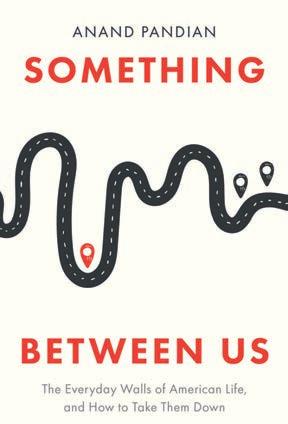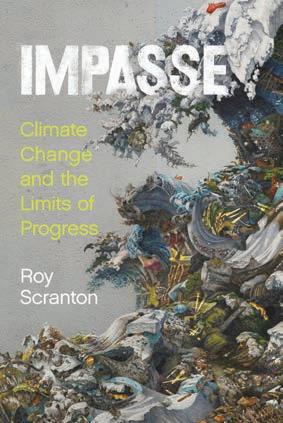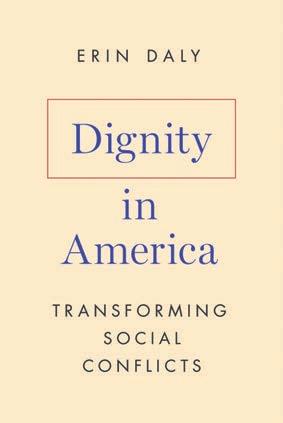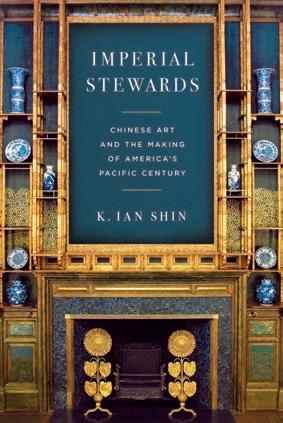





























































































































Spring+Summer 2025
























General Interest 1–3
Stanford Business Books 4–7
Anthropology 8–11
Asian Studies 11–15
History 15–17
Humanities 18–25
Jewish Studies 26–28
Latin American Studies 28–29
Law 30–31
Middle East Studies 31–36
Sociology 36–40
New in Paperback 41–42
In Judaism, meat is of paramount importance as it constitutes the very focal point of the dietary laws. With an intricate set of codi ed regulations concerning forbidden and permissible meats, highly prescribed methods of killing, and elaborate rules governing consumption, meat is one of the most visible, and gustatory, markers of Jewish distinctness and social separation. It is an object of tangible, touchable, and tastable di erence like no other.
In All Consuming, historian John M. Efron focuses on the contested culture of meat and its role in the formation of ethnic identities in Germany. To an extent not seen elsewhere in Europe, Germans have identi ed, thought about, studied, decried, and gladly eaten meat understood to be “Jewish.” Expressions of this engagement are found across the cultural landscape—in literature, sculpture, and visual arts—and evident in legal codes and commercial enterprises. Likewise, Jews in Germany have vigorously defended their meats and the culture and rituals surrounding them by educating Germans and Jews alike about their meaning and relevance.
Exploring a cultural history that extends some seven hundred years, from the Middle Ages to today, Efron goes beyond a discussion of dietary laws and ritual slaughter to take a broad view of what meat can tell us about German-Jewish identity and culinary culture, Jewish and Christian religious sensibilities, and religious freedom for minorities in Germany. In so doing, he provides a singular window into the rich, fraught, and ultimately tragic history of German Jewry.


John M. Efron Koret Professor of Jewish History at the University of California, Berkeley. He is the author of German Jewry and the Allure of the Sephardic (2016) and e Jews: A History, now in its third edition (2019), among other books.

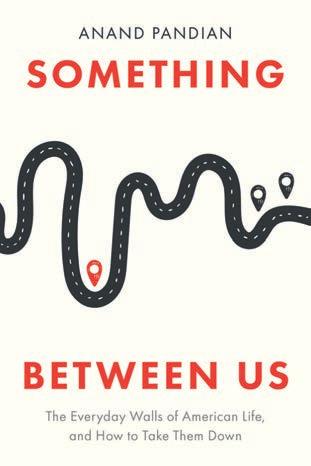
Whether the plight of refugees or the recent pandemic, the climate crisis or systemic racism, so much turns on the care and concern we can muster for lives and circumstances beyond our own. And yet, the deep divides of national life in the United States have made e ective action on such ma ers a serious and sometimes intractable challenge. Why is it so di cult to acknowledge and address the intertwining of our lives with others?
Over the last eight years, anthropologist Anand Pandian has crisscrossed the United States talking with Americans of all kinds, seeking to make sense of the ruptures that plague our physical and psychological social fabric. Insider versus outsider, familiar versus stranger, safety versus threat: these stark distinctions are anchored and sustained by the makeup of so much of contemporary American life, from forti ed neighborhoods to bulked-up cars, from visions of the body as an armored fortress to media that shut out contrary perspectives. ese interlocking divides make it di cult to take unfamiliar people and perspectives seriously, harder to acknowledge the needs of strangers, harder to trust their motives and empathize with their struggles.
Using the tools of an anthropologist, Pandian interweaves vivid and challenging encounters—with salesmen and truck drivers, police o cers a nd urban planners, activists for racial and environmental justice and many others—with fascinating historical and cultural analysis that challenges us to think beyond the twists and turns of our immediate present. While our impasses draw from deep American histories of segregation and suspicion, Pandian shows us how the work of mutual aid and communal caretaking can help us surface more radical visions for a life in common with others, and teach us how to meet strangers in this land as potential kin.

Anand Pandian is Professor of Anthropology at Johns Hopkins University. He has wri en and edited several books, including Anthropocene Unseen: A Lexicon (2020) and A Possible Anthropology (2019). He is the 2024-2025 President of the Society for Cultural Anthropology.


Extreme heat, res, oods, and storms are transforming our planet. Yet instead of serious responses from world leaders, we get increasing emissions, divisive politics, and ersatz solutions that o er more of the same: more capitalism, more complexity, more “progress.”
e impasse we face is not only political and institutional, but cognitive, existential, and narrative. We’re incapable of grasping the scale, speed, and impact of global warming. Our brains can’t make sense of how radically our world is changing. And we optimistically cling to a civilizational narrative that promises a be er tomorrow if we just keep doing what we’re doing.
It’s well past time, Roy Scranton argues, to free ourselves from our dangerous and dogmatic faith in progress. Such unwarranted optimism will only accelerate our collective disintegration. If we want to have any hope at all for the future, it must be grounded in a recognition of human limits—a view Scranton calls ethical pessimism.
Drawing from psychology, philosophy, history, and politics, as well as lm, literature, and personal experience, Scranton describes the challenges we face in making sense of our predicament, from problems in communication to questions of justice, from the inherent biases in human perception to the di culties of empirical knowledge. What emerges is a challenging but ultimately hopeful proposition: if we have the courage to accept our limits, we may nd a way to embrace our unknowable future.

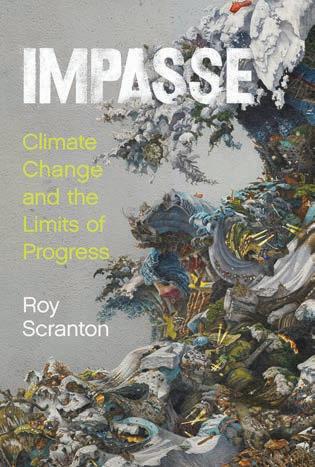
Roy Scranton is the author of several books, including Learning to Die in the Anthropocene, Total Mobilization: World War II and American Literature, and the novel War Porn. A 2024 Guggenheim Fellow, Scranton teaches at the University of Notre Dame, where he directs the Environmental Humanities Initiative.

New product launches are risky. But disciplined innovation practices lead to success rates well above industry benchmarks. Predictable Winners is a comprehensive handbook of best practices for improving the odds of success at every step of the innovation journey—from concept development through commercial launch and beyond. Product leaders, innovation teams, and senior executives will nd practical insights to reduce product risk and improve R&D e ectiveness and ROI, while delighting customers with a pipeline of compelling new products and services.
e authors’ systematic approach is covered step-by-step in twenty- ve chapters on topics like assembling the right team, identifying innovation opportunities, conducting a disciplined, data-driven assessment of a new product’s revenue potential, making wise investment decisions, and more. Predictable Winners also details how to use quantitative tools to disaggregate and reduce the distinct risks around competing product concepts, customer segments, channels, pricing, and launch planning. Finally, because not all breakthrough innovation comes from internal teams, the authors also explain advanced strategies for improving the odds of success: balancing organic innovation with external acquisitions or licensing.


Stuart E. Jackson is Vice Chair of L.E.K. Consulting, a global rm advising clients on new product growth and acquisitions. His work has been published in Harvard Business Review, Forbes, Journal of Business Strategy, and e Wall Street Journal
Ilya Trakhtenberg (MBA, Kellogg/Northwestern) is a Managing Director in L.E.K. Consulting’s Chicago o ce.


Today’s business schools were designed for a world that no longer exists. Capitalism raised the standard of living for billions of people over the past 150 years, but is now causing systemic challenges it is unable to address, including climate change and inequality. And yet, business schools continue to teach ideas that are making things worse: elevating the primacy of shareholder pro ts above the interests of employees, the environment, and society; viewing government as an intrusion on the free market rather than an arbiter of its proper functioning; and promoting unlimited economic growth despite the devastating environmental and social consequences. Business schools cannot simply drop an elective into their curriculum to address these challenges. We must rethink the faulty foundations.
Business School and the Noble Purpose of the Market explains the intellectual foundation MBA students, faculty, and administrators need to reform capitalism and restore its noble purpose for the 21st century. Many business students are in fact seeking this kind of education and frustrated that they are not ge ing it from their professors. is book will ll in gaps in their education, equipping them with the models and mindset to rethink shareholder capitalism and serve society’s needs. Business faculty and administrators will nd a practical program for amending curriculum and pedagogy, changing student and faculty rewards, and bringing a new spirit and sensibility to the business school.


Andrew J. Ho man is the Holcim (US) Professor at the University of Michigan’s Ross School of Business. He has published 18 books and over 100 articles/book chapters. His work has been covered in e New York Times, Scienti c American, Time, Wall Street Journal, The Atlantic, and National Public Radio.

e need to demonstrate the e ectiveness of nonpro t social programs has led to a rapid rise in the use of randomized controlled trials (RCTs), for evaluation. As a result, most nonpro t sector professionals can tell you why nonpro ts should do an RCT. is book tells you why they probably shouldn’t, and what to do instead.
Mismeasuring Impact explores why RCTs are being embraced as the “gold standard” for nonpro t evaluation, despite the high cost and time investment required and the serious problems with using RCTs in a nonpro t context. (Most RCTs conducted in nonpro ts fail to meet required standards for rigor, undercutting their accuracy). e book describes what happens inside nonpro ts when they take part in RCTs, the unintended equity issues that arise, and why nonprofits feel pressured participate in RCTs despite the problems.
University of Chicago professors Marwell and Mosley’s research is based on extensive interviews with key players: nonpro t managers, professional program evaluators, and program o cers in philanthropic foundations. e book argues that, ultimately, RCTs are used to poorly ground nonpro t legitimacy, not to foster nonpro t improvement. RCTs also privilege program and organizational standardization over the key strengths of nonpro t organizations: exible innovation and responsiveness to community needs.
Nonpro ts and funders need forms of evaluation that li up these strengths. Mismeasuring Impact o ers alternative approaches that build strong organizations, not just cookie-cu er programs, and which funders and nonpro ts of all sizes can support.


Nicole P. Marwell and Jennifer E. Mosley are Professors at the Crown Family School of Social Work, Policy, and Practice at the University of Chicago. eir research on nonpro t organizations has been published widely in leading journals in the elds of nonpro t studies, sociology, public administration, and social work.


How Zoom, HubSpot, Atlassian, and Other Top Companies Use Product-Led Growth… for
Companies like Dropbox, Zoom, Slack, Atlassian, and DocuSign grew into multibillion-dollar companies using the 3-step “Freemium” product strategy: (1) instead of hiring an expensive sales force, give away so ware for free; (2) let happy users tell others; (3) o er a premium subscription version, producing a recurring revenue stream. Over the last three decades, Freemium strategy has evolved into a practice known to tech industry insiders as “product-led growth,” which Harvard Business School Lecturer Frank Cespedes calls, “probably the fastest-growing go-to-market model for businesses globally.”
Freemium is the authoritative guide to product-led growth, wri en by Silicon Valley entrepreneur and Harvard MBA Dave Boyce, who teaches the rst MBA-level course on the topic. Freemium explains how to develop a product that can sell itself, how to ward o competitors, and how to seamlessly move upmarket, selling to larger customers. It details how the product itself (instead of expensive employees) can be used for customer onboarding, customer service, and customer retention. Freemium also details how nonso ware companies and enterprise sales led companies are combining product-led growth tactics with more traditional go-to-market initiatives.
Competing in nearly every tech-related industry today requires an understanding of the principles of product-led growth. Freemium is the comprehensive, practical handbook for this unicorn-building strategy.

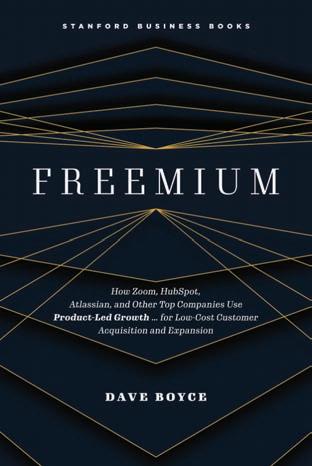
Dave Boyce is a 5-time Silicon Valley so ware entrepreneur, and teacher of the world’s rst MBA-level course on Freemium Strategy/Product-Led Growth. He serves on the board of Forrester (NASDAQ: FORR) and is an active startup advisor and board member.


From its development in the 1980s, the sanctuary city movement—municipal protection of people with uncertain migration status from national immigration enforcement—has been a powerful and controversial side of progressive migration policy reform. While some migration activists view sanctuary city policy as the most important aspect of their work, others see it as actively impairing e orts in the ght for migrant rights. In Making Sanctuary Cities, Rachel Humphris provides a new understanding of how citizenship is negotiated and contested in sanctuary cities and what political potentials are opened (and closed) by this designation. rough long-term eldwork across the sanctuary cities of San Francisco, She eld, and Toronto—three of the rst municipalities to adopt this designation in their respective countries— Humphris investigates the complexity of sanctuary city policy. By capturing the wide-ranging meanings and practices of sanctuary in comparative context, Humphris uncovers how liberal citizenship is undermined by the very thing that makes it worth investing in: the promise of equality. A ending to the tensions inherent in sanctuary policy, this book opens vital questions about the ways governing systems can extinguish political ideals, and how communities choose to live and organize to ght for a be er world.
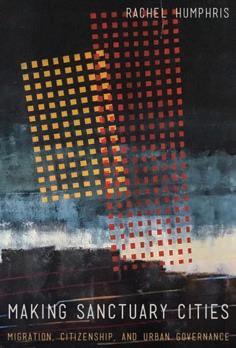

Sustainability has become a touchstone for development worldwide, promising an antidote to environmental degradation and capitalism’s excess: waste. Refusing Sustainability presents a fundamentally di erent account of sustainability and waste itself by uncovering the intersections of international environmental reforms and racialized labor. In Bulgaria, Roma comprise the bulk of the country’s waste workers, while anti-Roma racism casts them as socially disposable. Without their labor, however, the country cannot meet the sustainability targets required by the European Union. Drawing on eldwork that spans twenty years, including eleven months working alongside Romani women street sweepers, and years embedded in waste organizations, political campaigns, Roma NGOs, and activist groups, Elana Resnick analyzes the power hierarchies at play in both waste management and European expansion projects. Simultaneously, she examines how communities racialized as discardable push back against a system that relies on and excludes them.
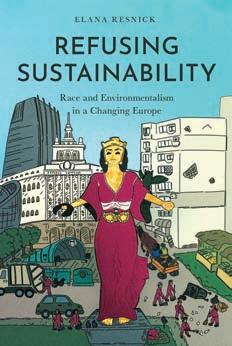
Rachel Humphris is Senior Lecturer in Sociology and Politics at Queen Mary University of London.
Instead of focusing on only environmental harms or toxic distributions, Refusing Sustainability approaches Romani life-worlds as spaces of creative production. Resnick tells the stories of ordinary people who reject the status quo—the conditions of what she calls racial sustainability. rough their experiences, she also tells several larger stories: of postsocialist racial capitalism, environmental progressivism, Europeanization, the failure of democratic politics, neighborhood mutual aid, and the power of women’s friendships.
Elana Resnick is Assistant Professor of Anthropology at the University of California, Santa Barbara.
News media and pundits too frequently perpetuate the notion that Latinos, both US-born and immigrants, are an invading force bent on destroying the American way of life. Leo R. Chavez challenges the basic tenents of this assumption and other myths of the “Latino threat,” providing a critical investigation into the fears and prejudices that are used to malign an entire population. In this updated and expanded third edition of his groundbreaking book, Chavez incorporates Donald Trump’s emergence in American political life, with particular focus on the US-Mexico border as a site of political theater and the further sharpening of anti-Latino and anti-immigration rhetoric in public discourse. He also includes new discussions of “anchor babies,” Dreamers and DACA, Latina reproduction and white replacement theory, and the emotional and psychological e ects of negative political rhetoric on those whom it targets. rough trenchant analysis, this book reexamines urgent questions about what it means to be American.

Leo R. Chavez is Professor of Anthropology at the University of California, Irvine. He is the author of several books, including Anchor Babies and the Challenge of Birthright Citizenship (Stanford, 2017). He was elected to the American Academy of Arts and Sciences in 2023.







Decolonizing Medicine examines Bolivian state-led e orts to decolonize health services during the administration of Evo Morales, Bolivia’s rst Indigenous president. Governing from 2006 to 2019, the Morales administration undertook sweeping reforms, vowing to reverse intertwined colonial and capitalist systems of oppression and restore Indigenous good living. Predating more recent calls from global health practitioners to “decolonize global health,” Bolivian state projects included a range of initiatives, such as integrating Indigenous traditional medical practitioners into clinical care and encouraging cultural sensitivity among healthcare providers. And yet, despite layered institutional investments, many Indigenous patients continued to describe their local hospital as a place “donde no hay atención” (“where there is no care”). rough ne-grained ethnography of health policymaking and implementation, Gabriela Elisa Morales tracks how Bolivian biomedical and public health institutions fell short of the far-reaching transformations proposed by decolonial activists and theorists. At the same time, she foregrounds how Indigenous patients and healers challenged the terms of caregiving and demanded that state and medical institutions ful ll their obligations to Indigenous ourishing. In tracing these dynamics, Morales articulates the multiplicity of ways that care practice becomes a locus of political foreclosure as well as radical transformation, with crucial insights for broader projects of decolonization and Indigenous rights.


In 2016, the Peace Accords between the Revolutionary Armed Forces of Colombia–People’s Army (FARC–EP) and the Colombian government promised to bring an end to over y years of armed con ict. Yet, despite widespread international acclaim and heavy investments in the peace process, war continued. In this book, Anthony Dest provides a rigorous reassessment of the terms of peacebuilding through an ethnography of ongoing struggles for autonomy, based on over een years of research and activism in Colombia. By questioning the potential for peace under the aegis of the state, Dissident Peace opens up critical space from which to imagine more radical forms of peace.

Gabriela Morales is Assistant Professor of Anthropology at Scripps College.
From the coca elds of southwestern Colombia to the negotiating table in Cuba, Dissident Peace brings the contradictions of peacebuilding and organizing to life. roughout the book, Dest locates contemporary violence within longer histories of colonial capitalism and centers the lives and insights of Black and Indigenous communities in Colombia. He identi es “dissident peace” as a potent alternative to dominant, state-centric peace frameworks— one based on evolving principles of autonomy and self-determination by marginalized communities. With vital implications for social movements globally, this book provides a gripping account of what it means to struggle today.
Anthony Dest is Assistant Professor of Anthropology at Lehman College, City University of New York.

What is it about nonpro ts that inspires so many to passionately support their agendas and others to adamantly seek their control?

In India, laws regulating the nonpro t sector were dramatically reformed between 2010–2020, recon guring relationships between corporations, nonpro ts, and the government. ousands of nonpro ts, including powerful NGOs, lost their ability to receive foreign funding, and in 2015 dozens more were put on a state-sponsored watch list. While many assume that nonpro ts are de ned by the causes they champion, A Revolution of Rules demonstrates that the nonpro t form is shaped primarily through its regulation, in a dynamic process of democratic and political negotiation.
Erica Bornstein argues that the scrutiny of nonpro ts in India must be understood in a wider, global context of political judicialization and regulatory reform. She examines how members of nonpro t organizations are the unsung heroes of democracy as they navigate a shrinking stage for rights-based work and struggle to protect civil society. e protagonists featured in this book include nonpro t workers, lawyers, accountants, philanthropists, and civil servants who conduct their work on the sidelines—at workshops, in modest o ces, through report-writing and petitions. To understand nonpro ts and their relationship to democracy in the world, Bornstein asserts, one must look to the deceptively unassuming sites of struggle over the nonpro t form and its regulation.
Erica Bornstein is Professor of Anthropology at the University of Oregon. She is the author of Disquieting Gi s: Humanitarianism in New Delhi (Stanford, 2012).

Across the world, protest has become a much-debated tactic in struggles against extreme inequality, political corruption, and ecological disaster. In South Korea, protest is a ubiquitous and essential form of political expression. In 1987, mass protests forced reforms that led to the present-day government of South Korea. In 2017, the Candlelight movement forced the removal of then-president Park Geun-hye. Beyond these spectacular national protests, aggrieved Korean workers and minority groups regularly turn to protest to assert their rights.
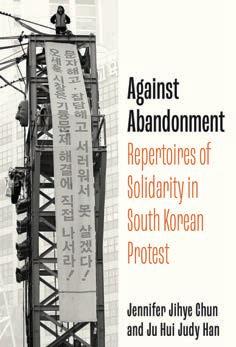
Based on long-term ethnographic research with labor and social movement activists, Against Abandonment is at once a chronicle of the life-and-death character of protesting precarity in South Korea and a searing examination of repertoires of solidarity for upending injustice. Protest forms such as long-term encampments, life-threatening hunger strikes, and perilous high-altitude occupations are agonizing to perform and to witness but o en powerful as catalysts for change. Chun and Han situate South Korean protest in transnational context to demonstrate how the struggles of South Korean workers are inextricably tied to the globalized conditions of neoliberal capitalism. Building on the work of abolitionist feminist thinkers, the book theorizes protest as a political form with far-reaching resonance across history and geography, and underscores the signi cance of collective survival, self-determination, and emancipatory transformation.
Jennifer Jihye Chun is a sociologist and Associate Professor of Asian American Studies at the University of California, Los Angeles.
Ju Hui Judy Han is a geographer and Assistant Professor of Gender Studies at the University of California, Los Angeles.

Reforma ing Agrarian Life presents a stealth urban history from the countryside that foregrounds the mutual entanglements of agrarian and urban expertise. William J. Glover traces an essential genealogy for understanding how urbanism unexpectedly le the city in late colonial India and began to se le in agrarian space, exploring how two milieus that were initially seen as distinct were gradually brought together both conceptually and in practices of ordinary life. He argues that rural change and the expert knowledge associated with managing the countryside in colonial India opened paths for urban concepts and forms to permeate agrarian se ings where they were previously thought to have li le relevance. is process indelibly shaped idioms and modes of agrarian life, just as it gave rural problems and processes a structural role in urban discourse.



By illuminating the intellectual paths by which agrarian and urban processes came to be understood as co-constituting, and exploring multiple vivid, empirically rich case studies of projects where those relations were made evident, this book presents a compelling case to move beyond traditional intellectual silos and enter new theoretical territory to understand processes of urban and rural transformation.
William J. Glover is Associate Professor of History at the University of Michigan. He is the author of Making Lahore Modern: Constructing and Imagining a Colonial City (2008).
A er four decades of market reform, China has developed a fast-growing, prosperous economy—the second largest in the world. Despite this prosperity, social inequality has persisted and expanded, particularly among rural migrant workers, and oppressive labor conditions have given rise to an increase in worker protests. In China’s authoritarian political context, worker strikes o en face suppression and receive li le a ention in mainstream media, which has led burgeoning forms of alternative mediated practices to become key, if complicated, components of worker resistance. In Contesting Inequalities, Siyuan Yin traces the historical and structural forces surrounding the plight of migrant workers, especially women workers, and examines the relationship between media and di erent forms of collective action in China. Moving beyond considerations of short-term strikes, she analyzes how mediated practices have been incorporated as both means and ends in labor activism.
Based on long-term, multi-sited, and digital ethnography, and drawing on feminist methodologies, Yin examines di erent forms of mediated labor activism—including theater performance, advocacy music, and digital community media—to survey the politics and impact of worker mobilization and actions. By explicating how mediated labor activism has enabled new subjectivities, counter-discourses, and informal networks, Yin demonstrates that the surge in Chinese working-class resistance highlights the interconnectedness of class struggles and feminist activism.
Siyuan Yin is Assistant Professor of Communication at Simon Fraser University.
Queer Vietnam recovers the forgo en stories of variant genders and sexualities in early twentieth-century Vietnam. By the beginning of the 1900s, European imperialism had spread Western notions of gender across much of Asia, narrowing and delegitimizing what had been a wide range of acceptable gender practices. But in Vietnam, Western in uence on gender remained uneven at best. rough archival research and innovative readings of literary sources, Richard Quang-Anh Tran argues that Vietnamese culture embraced a much less rigid view of the human body, and that a far more capacious vision of gendered personhood existed in this period than has been previously assumed. Popular love stories involved cross-dressing monks and traditional women who don male garb to ght in ba le. And accounts of proto-lesbian friendships and a futuristic human civilization populated by a higher form of hermaphroditic species all found avid readers. Together, this material reveals that in Vietnam’s interwar period, “tradition” coexisted with and jostled against the modern. While current perceptions of Vietnamese history rest on the exclusion of the “queer”—subjects who depart from heteronormative ways of being—this book brings them to the center, and opens up new directions for both the historical study of gender and Vietnam’s modernity.


Richard Quang-Anh Tran is a Scholar-in-Residence in the Program in Critical eory at the University of California, Berkeley.

Australia, China, and India

e Asia-Paci c region has seen extraordinary economic achievements. Japan’s post-World War II transformation into an economic powerhouse challenging US dominance by the late 1980s was miraculous. China’s rise as the world’s second-largest economy is one of the 21st century’s most stunning stories. India, now a top- ve economy by GDP, is rapidly ascending. Despite its small population, Australia ranked among the top ten GDP nations in 1960 and has remained resilient. While cultivating, a racting, and leveraging talent has been crucial to growth in these countries, their approaches have varied widely, re ecting signi cant cultural, historical, and institutional di erences.



In this sweeping analysis of talent development strategies, Gi-Wook Shin investigates how these four “talent giants’’ achieved economic power and sustained momentum by responding to risks and challenges such as demographic crises, brain drain, and geopolitical tensions. is book o ers invaluable insights for policymakers and is essential for scholars, students, and readers interested in understanding the dynamics of talent and economic growth in the Asia-Paci c region and beyond.
Gi-Wook Shin is the William J. Perry Professor of Contemporary Korea in Sociology and the Freeman Spogli Institute for International Studies at Stanford University. Shin is the author or editor of twenty- ve books, including Korean Democracy in Crisis: e reats of Illiberalism, Populism, and Polarization (2022).
Starving ghosts, anguished farmers, and grieving mothers. Floating heads, gaunt bodies, and masses of bodily uids. Such are the visceral sensations, exaggerated a ects, and su ering subjects that characterized le ist Korean cultural production in the 1920s and 1930s. In popular ction, print cartoons, reportage, and other emergent forms of mass culture, scenes detailing the spectacular bodily harms endured by gures like migrant workers, tenant farmers, and everyday families proliferated. Yet at the time such representations were criticized as excessively grotesque and insuciently political by le ist intellectuals, and they have subsequently been overlooked by scholars in favor of socialist realism and its dynamic proletarian heroes.
e Sensational Proletarian, by contrast, focuses on these textual and visual representations to tell the story of how new a ects and everyday experiences introduced by imperial capitalism and colonial modernity were mediated through the lower-class body. Kimberly Chung traces the emergence of “the sensational proletarian” as a central gure of colonial Korean print culture and reads its varied manifestations as emblematic of Korean e orts not only to grapple with modernity, imperialism, and capitalism, but to do so using the new political ideology and imaginary of Marxism. is book brings to light the centrality of sensational cultures in the development of class politics in Korea, an integral relationship that continues throughout modern and contemporary Korean cultural history.
Kimberly Chung is Assistant Professor of Korean Literary and Cultural Studies at McGill University.
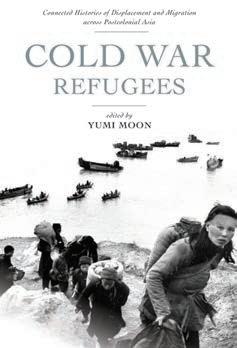
Scenes of refugees eeing Communist countries have created iconic images of the Cold War in Asia. Despite their symbolic prominence, the experiences and trajectories of these refugees have remained relatively obscure in Cold War history and global refugee studies. Featuring contributions from Phi-Vân Nguyen, Dominic Meng-Hsuan Yang, Yumi Moon, Ijlal Muza ar, Robert D. Crews, Sabauon Nasseri, and Aishwary Kumar, Cold War Refugees meticulously investigates and connects cases across East, Southeast, and South Asia. O ering a transnational and transimperial perspective, this book illuminates the massive mobility of refugee populations across Asia and emphasizes the critical roles of arti cial borders, displacement, and violence in shaping the global Cold War.


From the outset of the twentieth century, Egyptian and Indian leaders understood their movements for self-determination as linked and part of a shared project. Following World War I, as connections between the Middle East and South Asia proliferated, Egypt and India lay squarely at the heart of increasingly complex and multilateral relations. East of Empire traces how anticolonial nationalism gained momentum across the East and documents the friendships, rivalries, cultural exchanges, and shi ing political alliances that came to animate the interwar project of Easternism: a cosmopolitan vision of the world whose center of gravity lay beyond Europe, in the great city of Cairo.
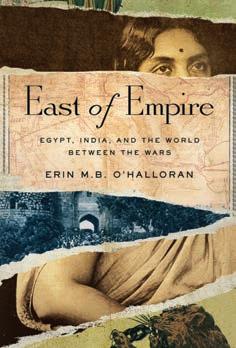
Drawing from multilingual archival sources, the authors explore the local, regional, and global contexts of displacement through ve cases: Taiwan, Vietnam, Korea, Afghanistan, and Pakistan. ey examine the agendas, identities, and cultures of the refugees who le their homes due to revolutions or wars amid the con ict between the US and the USSR, presenting them as historical actors rather than mere subjects of legal, governmental, or humanitarian discourse. By revisiting key Cold War events in Asia, the book provides a critical revision of Cold War history through the lens of refugee experiences and agency.
Yumi Moon is Associate Professor of History at Stanford University. She is the author of Populist Collaborators: e Ilchinhoe and the Japanese Colonization of Korea, 1896–1910 (2013).
Erin O’Halloran o ers a compelling new account of the era immediately preceding decolonization and the epochal partitions of India and Palestine. Alongside well-known gures like Mohandas K. Gandhi, Jawaharlal Nehru, and Saad Zaghlul, she introduces less familiar but no less intriguing personalities: feminists, diplomats, and poets; surrealists, socialists and spies. Each dreamed, wrote, organized and fought for the liberation of the East—a space universally evoked, though seemingly impossible to pin down. Drawing on a broad cross-section of Indian, Arab, British, and European sources, East of Empire transcends archival partitions to tell a powerful and nearly forgo en set of stories about the rise of anticolonial nationalism and the end of empire across the Middle East and South Asia.
Erin M.B. O’Halloran is Marie Sklodowska Curie European Research Fellow at the University of Cambridge.

Writing history, the systematic e ort to understand the human past, is a demanding intellectual endeavor. For historian Gordon H. Chang, it has also been a personal and moral enterprise intimately connected to his commitment to realizing a be er world. is career-spanning anthology brings together signi cant essays, developing conversations across his broad-ranging research interests and personal history and engaging a range of topics, from diplomatic history and Asian American history to art history. e book begins with a preface that re ects on the rise of Asian American studies as a eld and the author’s own scholarly trajectory. Each essay is accompanied by new headnotes that provide context. Essays examine the many ways that race, especially regarding Asian Americans, connects important historical episodes and social issues. emes of geopolitical con ict, race, and transnational methods link writing produced over several decades, illustrating the arc of an intellectual career and the development of the eld of Asian American studies. Ultimately, this book highlights Chang’s abiding interest in providing historical context for issues facing Asian Americans, particularly during a time of rising geopolitical tensions and anti-Asian violence.
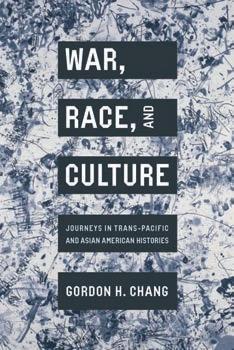
Jinping

China’s leader, Xi Jinping, is one of the most powerful individuals in the world—and one of the least understood. Much can be learned, however, about both Xi Jinping and the nature of the party he leads from the memory and legacy of his father, the revolutionary Xi Zhongxun (1913–2002). e elder Xi served the Chinese Communist Party (CCP) for more than seven decades. He worked at the right hand of prominent leaders Zhou Enlai and Hu Yaobang. He helped build the Communist base area that saved Mao Zedong in 1935, and he initiated the Special Economic Zones that launched China into the reform era a er Mao’s death. He led the Party’s United Front e orts toward Tibetans, Uyghurs, and Taiwanese. And though in 1989 he initially sought to avoid violence, he ultimately supported the Party’s crackdown on the Tiananmen protesters.
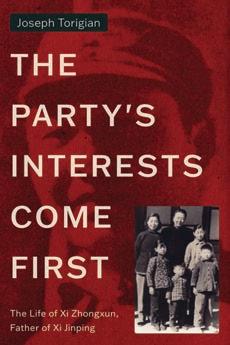
Gordon H. Chang is Professor of History and Olive H. Palmer Professor in Humanities at Stanford University and a member of the American Academy of Arts and Sciences. He is the author of Ghosts of Gold Mountain: e Epic Story of the Chinese Who Built the Transcontinental Railroad (2019) and coeditor of e Chinese and the Iron Road: Building the Transcontinental Railroad (Stanford, 2019), among other books.
e Party’s Interests Come First is the rst biography of Xi Zhongxun wri en in English. is biography is at once a sweeping story of the Chinese revolution and the rst several decades of the People’s Republic of China and a deeply personal story about making sense of one’s own identity within a larger political context. Drawing on an array of new documents, interviews, diaries, and periodicals, Joseph Torigian vividly tells the life story of Xi Zhongxun, a man who spent his entire life struggling to balance his own feelings with the Party’s demands. rough the eyes of Xi Jinping’s father, Torigian reveals the extraordinary organizational, ideological, and coercive power of the CCP—and the terrible cost in human su ering that comes with it.
Joseph Torigian is Associate Professor at the School of International Service at American University and a Research Fellow at the Hoover History Lab at Stanford University.

From the Gilded Age to World War II, elite collectors and museums in the United States transformed from owning a sma ering of Chinese porcelain as curios to possessing some of the world’s largest and most sophisticated collections of Chinese art. Imperial Stewards argues that, beyond aesthetic taste and economics, geopolitics were critical to this transformation. Collecting and studying Chinese art and antiquities honed Americans’ belief that they should dominate Asia and the Paci c Ocean through the ideology of imperial stewardship—a view that encompassed both genuine curiosity and care for Chinese art, and the enduring structures of domination and othering that underpinned the burgeoning transpaci c art market.
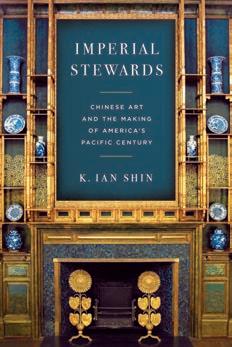
e Poyais Scandal in the Early
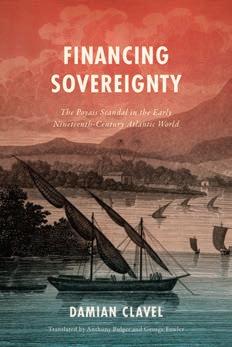
Financing Sovereignty rewrites the story of one of the great nancial frauds of the nineteenth century: Gregor MacGregor, a Sco ish mercenary and self-proclaimed cacique of Poyais, borrowed massive sums on the City of London’s burgeoning South American sovereign debt market by selling bonds of the State of Poyais. e only problem—Poyais did not exist. At least, that is what MacGregor was quickly accused of by the press and public opinion at the time. From then on, MacGregor has embodied the gure of the swindler par excellence, the con artist behind the most audacious nancial fraud in history.

Tracing networks across both the Paci c and the Atlantic, K. Ian Shin uncovers a diverse cast of historical actors that both contributed to US imperial stewardship and also challenged it, including Protestant missionaries, German diplomats, ChineseHawaiian merchants, and Chinese overseas students, among others. By examining the development of Chinese art collecting and scholarship in the United States around the turn of the twentieth century, Imperial Stewards reveals both the cultural impetus behind Americans’ long-standing aspirations for a Paci c Century and a way to understand—and critique—the duality of US imperial power around the globe.
K. Ian Shin is Assistant Professor of History and American Culture at the University of Michigan.
In Damian Clavel’s deeply researched retelling of the Poyais story, MacGregor is less an unscrupulous adventurer aiming to defraud English investors than a luckless intermediary between Indigenous Miskitu elites and British nanciers. From the coasts of Moskitia to the trading oors of London, Clavel traces the genesis, development, and downfall of the Poyais project, detailing how these events were the outcome of a failed a empt to nance the making of a new country in Central America. A microhistory set against the backdrop of global history, Financing Sovereignty o ers a new lens through which to view the political, economic, legal, and social dynamics of the nineteenth-century revolutionary, nancial, and imperial transformations that took place across the Atlantic.
Damian Clavel is an SNSF Ambizione Fellow at the University of Zurich.

We encounter digital data processing on a range of platforms and in a multitude of contexts today: in the predictive algorithms of the nancial sector, in drones, insurance, and risk management, in smart cities, biometrics, medicine, and more. is fascinating book explores the historical context of the current data-driven paradigm and explains how elusive yet crucial statistical concepts such as outliers, aggregates, and pa erns form how we sense and make sense of data. From the sixteenth century’s embodied measurements of the foot, through the blurred facial features of L’Homme Moyen, to the image aggregates of today’s security systems, the examples collected in this book illustrate the central role of aesthetics throughout the history of statistical knowledge production. Taking its point of departure in analyses and discussions of contemporary artistic experiments by Rossella Bisco i, Stéphanie Solinas, and Adam Broomberg and Oliver Chanarin, the book broadens our understanding of the structures of knowledge and methods in statistical computation beyond optimistic narratives of calculative power. Venturing out into the tails of the distributions—to the systemically overlooked and excluded—this book challenges us to embrace an alternative view of modern data processing.



Maja Bak Herrie, postdoc at e School of Communication and Culture at Aarhus University, works within the elds of aesthetics, media theory, and the philosophy of science on topics such as computational technologies of vision, scienti c imaging, photography, and artistic research. She is co-editor e Nordic Journal of Aesthetics.
Far from causing the “death of the book,” the publishing industry’s adoption of digital technologies has generated a multitude of new works that push the boundaries of literature and its presentation. In this fascinating new work, Élika Ortega proposes the notion of “binding media” — a practice where authors and publishers “fasten together” a codex and electronic or digital media to create literary works in the form of hybrid print-digital objects. Examining more than a hundred literary works from across the Americas, Ortega argues that binding media are not simply experimentations but a unique contemporary form of the book that e ectively challenges conventional regional and linguistic boundaries. Furthermore, the book demonstrates that binding media have remained marginal in the publishing industry due to technological imperatives like planned obsolescence and commercial ones like replicability and standardization that run counter to these bespoke literary projects. Although many binding media and other hybrid publishing initiatives have perished, they’ve le behind a wealth of material; collecting and tracing the residues of these foreshortened projects, Ortega builds a fascinating history of hybrid publishing. Ultimately, this essential account of contemporary book history highlights the way binding media help illuminate processes of cultural hybridization that have been instigated by the expediency of globalized digital technologies and transnational dynamics.
Élika Ortega is Assistant Professor in the Department of Spanish and Portuguese at the University of Colorado, Boulder.

In a series of incisive readings, Francisco E. Robles provides a literary history of midcentury US multiethnic literature, tracing the shi from coalitional aesthetics to multiculturalism by focusing on how migrancy and labor politics shape literary innovation. Along the way, Robles shows how writers kept the Popular Front’s legacy of coalitional aesthetics alive through literary practices of what he calls speaking with, whereby authors undo their authority as scribes, audiences become participatory interpreters, and texts emerge as places of communal and collaborative work.


e road novel is o en dismissed as a mundane, nostalgic genre: Jack, Sal, and other tedious white men on the road trying to recapture an authentic youth and American past that never existed. Yet, new road novels appear every year, tackling unexpected questions and spanning new geographies, from Mexico, Brazil, Bulgaria, Palestine, Ukraine, and former-Yugoslavia. Why did the road novel emerge and why does it persist? What does it do and why has it traveled so widely?
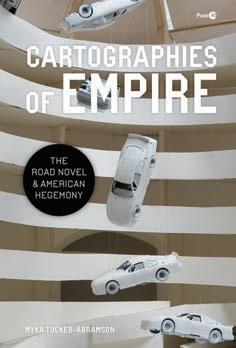
Beginning with signi cant, unexpected connections between Zora Neale Hurston and Muriel Rukeyser, and delving deeply into the work of Sanora Babb, Woody Guthrie, Gwendolyn Brooks, poets of the Memphis Sanitation Strike, Carlos Bulosan, Tomás Rivera, and authors included in is Bridge Called My Back, Robles examines texts whose range of experimental strategies deliberately engage gurations of movement, migration, and coalition. e experimentation these works display emerges from the particular methods of speaking with that they contain, whether it’s overcoming exclusion by nding new ways of representing migrants through word and sound, or in the astonishing ways these authors conceive of migrancy as neither static nor statistical but as a modality that necessitates writerly innovation. e result is a genealogy of coalitional aesthetics as a signi cantly important branch of American midcentury multiethnic writing that sustained and indeed extended the Popular Front and its legacies.
Francisco E. Robles is Assistant Professor of English, University of Notre Dame.
Myka Tucker-Abramson draws from an archive of more than 140 global road novels from over twenty countries, challenging dominant conceptions of the road novel as primarily concerned with American experiences and subjectivities. Grounding her analysis in materialist theories of genre, world-ecology and commodity frontier frameworks, and post-45 American literary studies, Tucker-Abramson persuasively argues that the road novel is a genre speci c to, coterminous with, and revealing of US hegemony’s global trajectory. Shi ing our focus from Americanness to the fraught geopolitics of US Empire, from the car to the built environment through which it moves, and from passengers to those le behind, Tucker-Abramson remaps the road novel, elucidating the genre’s unique ability both to reveal the violent and vertiginous processes of capitalist modernization and to obfuscate these harsh truths through seductive narratives of individual success and failure.
Myka Tucker-Abramson is Associate Professor, University of Warwick, and the author of Novel Shocks: Urban Renewal and the Cultural Origins of Neoliberalism (2018).

Some of the most meaningful moments in early American literature relied on historical pa erns of gi exchange, David Fa ik argues in this compelling book. Gi exchange kept a surprising variety of literary objects in circulation across the diverse societies, economies, and cultures of the Americas, from the seventeenth through the nineteenth centuries.

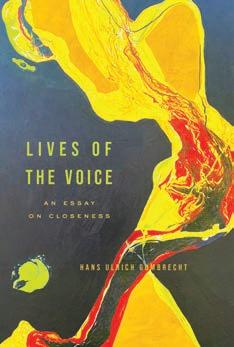

From the gi ing of a Narraganse grammar as a foundational event in the project of colonization in New England, to the use of Benjamin Franklin’s Poor Richard’s Almanack in the classrooms of an independent Brazil, to Catharine Maria Sedgwick’s ctions framing literature as the object of middle-class gi ing, chapters o er an interdisciplinary perspective on book history and literary history in the United States and beyond. Fa ik contends that it is because of the wild ways in which books circulated as gi s that works by Franklin, New England colonist Roger Williams, Sedgwick, Walt Whitman, and Emily Dickinson resisted the generic conventions of their day. O ering a revisionist account of how literary meaning is made, e Literary Gi in Early America calls for closer a ention to the historical pa erns of literary give and take in the Americas.
David Fa ik is Professor of English at the University of Rhode Island. His previous books include Transcendental Heresies: Harvard and the Modern American Practice of Unbelief (2020).
When it comes to understanding the ontology of individual existence—that is, the everyday behaviors that we all perform and hardly ever think about—the voice has a particularly complicated status. Together with writing, voice is the medium expressing ideas that, broadly speaking, we have previously formed in our minds. At the same time, voices trigger vague images and associations that do not have determinate forms.
Writing in both a personal and philosophical register, Hans Ulrich Gumbrecht explores the complexity of the voice as an understudied philosophical, social, and existential phenomenon. He starts out with a focus on its core intellectual problem as “the knot of the voice” —referring to the inseparable proximity between meanings, images, and the physical perceptions on which they depend. In conversation with Nietzsche, Husserl, Heidegger, Derrida, Lyotard, Luhmann, and above all Roland Barthes, Gumbrecht addresses topics that range from the social functions of the voice to its status in di erent historical contexts, and to the ways in which the perception of voices animates imagination. roughout, incisive analyses of moments such as Julius Caesar’s purportedly high-pitched voice, the surprisingly fragile authority of God’s voice in the Torah and in the Gospel, and Gumbrecht’s own personal a achment to the voices of popular singers such as Edith Piaf, Elvis Presley, and Adele, create a portrait of the voice that is both philosophically challenging and entertaining to read.
Hans Ulrich Gumbrecht is the Albert Guérard Professor in Literature Emeritus at Stanford University. His many books include Production of Presence (Stanford, 2004), In Praise of Athletic Beauty (2006), Atmosphere, Mood, Stimmung (Stanford, 2012), A er 1945 (Stanford, 2013), Crowds (Stanford, 2021), and Prose of the World (Stanford, 2021).

In this creaturely theory of the novel, Elisha Cohn rethinks the status of animals in recent global ction, arguing that literary representation of animals should ma er to any reader invested in the novel as a form, and showing how literary style makes knowable our imperiled multispecies worlds.
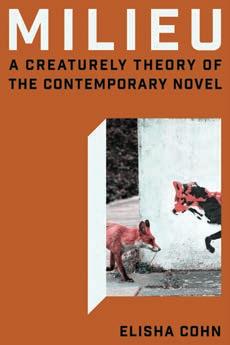

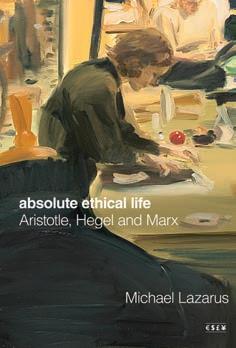
Cohn argues that the animal lives of contemporary ction move beyond allegories of globalization’s fracture of subjectivity by emphasizing the creaturely dimensions of narrative. is shi in focus registers through recent ction’s fascination with milieus: environments made perceptible through sentience that humans share with other creatures. Showing how theories of milieu—from Jacob von Uexküll, George Canguilhem, and Sylvia Wynter to recent studies in comparative cognition—converge with and are conceptually indebted to Indigenous and Black ontologies, Cohn argues that the milieu not only explains the centrality of animals to contemporary ction, but also promotes dialogue across disciplines invested in anti-hierarchic accounts of embodied life. Each chapter foregrounds formal resonances in texts from the mid-1990s through the present, including work by Téa Obreht, Yoko Tawada, NoViolet Bulawayo, Sigrid Nunez, Jesmyn Ward, Linda Hogan, Lucy Ellmann, Amitav Ghosh, and Amina a Forna. roughout, Cohn compellingly argues for the centrality of narrative voice in avoiding, deferring, or complicating modes of guration and critical interpretation that con rm human privilege.
Elisha Cohn is Associate Professor, Department of Literatures in English, Cornell University, and author of Still Life: Suspended Development in the Victorian Novel (2016).
Karl Marx gave us not just a critique of the political economy of capital but a way of confronting the impoverished ethical quality of life we face under capitalism. Interpreting Marx anew as an ethical thinker, Absolute Ethical Life provides crucial resources for understanding how freedom and rational agency are impacted by a social world formed by value under capitalism, with consequences for philosophy today.
Michael Lazarus situates Marx within a shared tradition of ethical inquiry, placing him in close dialogue with Aristotle and Hegel. Lazarus traces the ethical and political dimensions of Marx’s work missed by Hannah Arendt and Alasdair MacIntyre, two of the most profound critics of modern politics and ethics. Ultimately, the book claims that Marx’s value-form theory is both a continuation of Aristotelian and Hegelian themes and at the same time his most distinctive theoretical achievement.
In this normative interpretation of Marx, Lazarus integrates recent moral philosophy with a historically speci c analysis of capitalism as a social form of life. He challenges contemporary political and economic theory to insist that any conception of modern life needs to account for capitalism. With a robust critique of capitalism derived from the determinations of what Marx calls the “form of value,” Lazarus argues for an ethical life beyond capital.
Michael Lazarus is a postdoctoral research fellow at Deakin University.
On Goethe contains the full range of Walter Benjamin’s re ections on the central gure in modern German culture. e writings in this volume—newly translated, fully annotated, and framed by an extensive introduction—display a variety of styles and cover a vast array of topics. e collection revolves around two strikingly di erent essays. Whereas “Goethe’s Elective A nities” develops a theory of critique in which a work is illuminated wholly from within itself, an article Benjamin wrote on Goethe for the Soviet Encyclopedia represents his rst large-scale a empt to elaborate a historical-materialist methodology. e other thirty translations stand in similarly productive tension with one another. Some are concerned with concepts of beauty and categories of the aesthetic, others with the relation of art to politics and the status of “classical authors” in contemporary culture, and still others with what remains of humanistic traditions in the wake of their disappearance under fascist regimes and what synthesis is required for the construction of a historical object. e volume provides a glimpse into the laboratory of Benjamin’s thought, while granting readers a series of insights into the epochal phenomena that gather around the name “Goethe.”



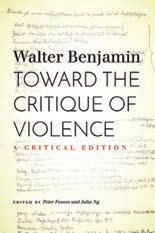
Walter Benjamin (1892–1940) was a German Jewish philosopher.
Susan Bernstein is Professor of Comparative Literature and German Studies at Brown University.
Peter Fenves is Joan and Serapta Harrison Professor of Literature at Northwestern University.
Kevin McLaughlin is George Hazard Crooker Professor of English, Comparative Literature, and German Studies at Brown University.

e term “Enlightenment” still carries its tie to a grand philosophical tradition that in Britain moves through Bacon, Locke, and Hume. But the literature and philosophy of the Enlightenment was full of practical knowledge associated with the body and with cra . is book is an account of the eighteenth-century thinkers from across social classes who turned to the body to formulate new ways of knowing natural and social worlds—what Ruth Mack calls handicra philosophies.
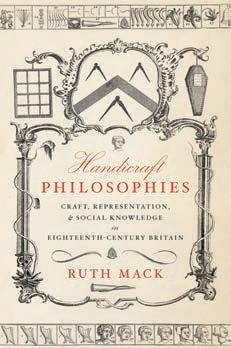

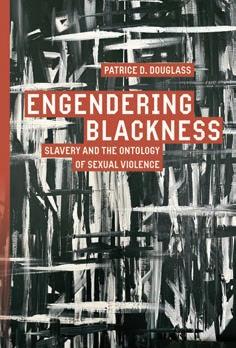
e writers discussed in this book include a formerly enslaved man, Olaudah Equiano, and a washerwoman, Mary Collier, as well as gentlemen Joseph Banks and James Boswell, and the artist William Hogarth. In their e orts to communicate embodied ways of knowing, they bring together theory and practice; they set aside objectivity and relish the practical ways of knowing that are traditionally associated with lower classes and less-than-privileged bodies. Mack focuses on how such knowledge proved especially helpful for understanding “society” as a new object of enquiry in the Enlightenment, laying the groundwork for the emergence of anthropological and sociological thought.
Complicating the intellectual history of Enlightenment Britain amidst the rise of popular science and imperial expansion, Handicra Philosophies is a new account of the thinkers who con gured “philosophy” as a practice open to all.
Ruth Mack is Associate Professor of English at the University at Bu alo, SUNY. She is the author of Literary Historicity: Literature and Historical Experience in Eighteenth-Century Britain (Stanford, 2008).
In this incisive new book, Patrice D. Douglass interrogates the relationship between sexual violence and modern racial slavery and nds it not only inseverable but also fundamental to the structural predicaments facing Blackness in the present. Douglass contends that the sexual violability of slaves is o en misappropriated by frameworks on sexual violence that privilege its occurrences as a question of ethics, sexual agency, and feminine orders of gendering. Rather, this book foregrounds Blackness as engendered by sexual violence, which forcefully (re)produces Blackness, corporeally and conceptually, as a condition that lacks the capacity to ontologically distinguish its su ering from what it means to be human. By employing and critically revising Black feminist theory and Afro-pessimism, Douglass reveals that engaging primarily with the sexualization of the slave forces theories of sexual violence to interrogate why this violence—one of the most prevalent under slavery—continues to lack a grammar of fundamental redress. ere are no reparations struggles for the generational transfer of sexual violation and the inability of present frameworks to rectify the sexual stains of slavery lies precisely in the fact that what made this history possible continues to haunt arrangements of life today. Engendering Blackness urgently articulates the way our present understandings of Blackness and humanness are bound by this vexed sexual history.
Patrice D. Douglass is Assistant Professor, Gender and Women’s Studies, University of California, Berkeley.

ough canon concerns seem to be a relic of 1990s academia, we are, once again, at a historical moment when there is resistance to teaching texts by writers of color and texts that deal with race, ethnicity and gender. At the same time, algorithmic bias scholars are locating systemic bias encoded into systems from policing so ware to housing so ware. Bringing these divergent areas together, Amy E. Earhart examines how technological and institutional infrastructures construct and deconstruct race, ethnicity and gender identities.
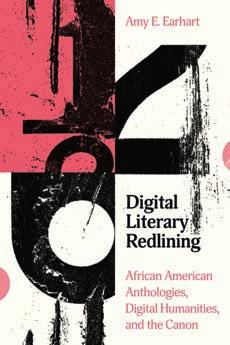


Focusing on two central infrastructures, the database, a commonly used technological infrastructure in the digital humanities, and the anthology, a scholarly and pedagogical infrastructure, Earhart considers how such seemingly naturalized infrastructures impact the representation and modeling of identity. e book draws upon the building and use of DALA, a collection of almost 100 years of generalist American and African American literature anthologies, constructed to investigate questions of identity and representation in literary anthologies and, by extension, the larger literary canon. e resulting examination, and its rigorous discussion of how identities are created and recreated within Black literary histories, has important implications for contemporary cultural and political debates about canon formation, literary scholarship, and the bias embedded in technological infrastructures.
Amy E. Earhart is Associate Professor, Department of English at Texas A&M University and author of Traces of the Old, Uses of the New: e Emergence of the Digital Literary Studies (2015).
In this cultural history of the computer, Benjamin Mangrum shows that comedy has been central to how we’ve made sense of the technology’s sweeping e ects on public life and private experience. From the rst Broadway play to include a computer in the 1950s to popular lms like You’ve Got Mail and joke-telling digital assistants, Mangrum assembles an extensive archive of work by writers, lmmakers, programmers, engineers, and other technologists who have coupled comedy with computation. Many have used comedy to make the computer seem ordinary. Others have tried to stage the assimilation of computers within corporate life as a kind of comic drama. Mangrum describes these and many other ways in which comedy and computation have come together as a new genre of experience: the comedy of computation. e modern world exalts advances in technology, but we are constantly haunted by the specter of falling behind and becoming obsolete. Mangrum examines how comedy serves as a stage for working out these con icted modes of experience in writing by Dave Eggers, Curtis Si enfeld, Ishmael Reed, and Kurt Vonnegut Jr., among others, arguing that when we look at the comic forms that shape the cultures of computing, we come to be er understand the tensions and contradictions internal to the social world we inhabit.
Benjamin Mangrum is Associate Professor of Literature at MIT and author of Land of Tomorrow: Postwar Fiction and the Crisis of American Liberalism (2019), winner of the Louis I. Bredvold Prize in 2019, awarded by the University of Michigan.
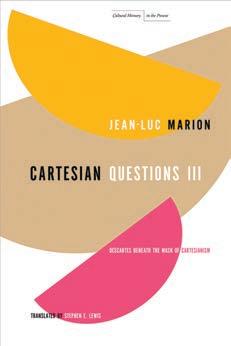
In this masterful work, Jean-Luc Marion shows how some of Descartes’ most decisive points remain masked by the various “Cartesianisms” that historiography and convenient simpli cations alike have constructed. e book’s rst half shows how Descartes lines up against Cartesianism, se ing forth several closely argued a empts to free up the positive status of skepticism in the Cartesian corpus, the non-substantial (and non-re exive) character of the ego cogito, the complex elaboration of the idea of the in nite, and the role of esteem as a mode of the cogitatio. Marion then o ers a second set of studies examining the work of Montaigne, Hobbes, and Spinoza and seeking to reconstitute some of the ways in which Cartesianism (and non-Cartesianism) become opposed to Descartes. Arising at the pivot point between these two paths of inquiry is a chapter dedicated to Descartes and phenomenology, with particular focus on how Descartes can be understood to have practiced—in his own way and by anticipation—a genuine phenomenological reduction. e nal volume in Jean-Luc Marion’s erudite trilogy of Cartesian Questions, this authoritative book demonstrates that, rather than belonging strictly to the past, Descartes continues to speak to our future.


Postwar French writers were at the vanguard of global literary innovation—from the experimental minimalism of the Nouveau Roman to the literary games of the OuLiPo—but less o en appreciated is the extent to which they worked closely with US editors and translators, published actively with American presses, and o en theorized transatlantic connections within their work.

Jean-Luc Marion is a member of the Académie Française. Previous books with Stanford include Revelation Comes om Elsewhere (2024), In the Self’s Place (2012), and Being Given (2002).
Stephen E. Lewis, Professor of English at the Franciscan University of Steubenville, has translated numerous books of French philosophy, including eight by Jean-Luc Marion.
Stephanie Rumpza is a researcher in philosophy at Sorbonne Université (Paris-IV) and author of Phenomenology of the Icon: Mediating God through the Image (2023).
In this exciting new work, Sara Kippur proposes a new French literary history that traces the deep connections between postwar literary experimentalism and the New York publishing industry, compellingly arguing that US-based editors, publishers, producers, professors, and translators crucially intervened to shape French literature. While Kippur a ends closely to well-known writers such as Marguerite Duras, Samuel Becke , Eugène Ionesco, Georges Perec, and Alain Robbe-Grillet, she also ampli es the voices of those who have been less visible, though no less relevant, including women whose contributions have not received proper credit but who helped to foster a sense of new possibilities for twentieth-century French writing. With these untold histories, stitched together in this book through new archival discoveries from special collections and personal archives on both sides of the Atlantic, Kippur begins to dismantle rigid notions of canonicity, authorship, and national literature.
Sara Kippur is Associate Professor of French and Francophone Studies, Wellesley College, and author of Writing It Twice: Self-Translation and the Making of a World Literature in French (2015)
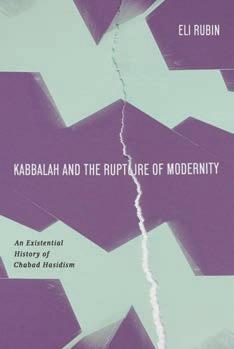
Kabbalah and the Rupture of Modernity provides a comprehensive intellectual and institutional history of Chabad Hasidism through the Kabbalistic concept of simsum. e onset of modernity, Eli Rubin argues, was heralded by this startling idea: existence itself is predicated on a self-in icted “rupture” in the in nite assertion of divinity. Centuries of theoretical disputations concerning simsum ultimately morphed into religious and social schism. ese debates confronted the meaning of being and forged the animating ethos of Chabad, the most dynamic movement in modern Judaism.



Chabad’s distinctive character and self-image, Rubin shows, emerged from its spirited defense of Hasidism’s interpretation of simsum as an act of love leading to rapturous reunion. is interpretation ignited a literal con agration, complete with book burnings, denunciations, investigations, and arrests. Chabad’s subsequent preoccupation with simsum was equally signi cant for questions of legitimacy, authority, and succession, as for existential questions of being and meaning.
Unfolding the story of Chabad from the early modern period to the twentieth century, this book provides fresh portraits of the successive leaders of the movement. Innovatively integrating history, philosophy, and literature, Rubin shows how Kabbalistic ideas are crucially entangled in the experience of modernity and in the response to its ruptures.
Eli Rubin is a contributing editor at Chabad.org. He received his PhD from the Department of Hebrew and Jewish Studies, University College London.
Following the British conquest of O oman Palestine, Jews across the British Empire—from Jerusalem to Johannesburg, London to Calcu a—found themselves at the heart of global Jewish political discourse. As these intellectuals, politicians, activists, and communal elites navigated shi ing political landscapes, some envisioned Palestine as a British dominion, leveraging imperial power for Jewish state-building, while others fostered ties with anticolonial movements, contemplating independent national aspirations. Uncertain Empire considers this intricate interplay between British imperialism, Zionism, and anticolonial movements from the 1917 British conquest of Palestine to the establishment of the state of Israel in 1948.
Elizabeth Imber highlights diverse and sometimes con icting visions of Jewish political futures, o ering detailed case studies of key gures including Chaim Arlosoro , Moshe Shertok, Helen Bentwich, Rachel Ezra, and Hermann Kallenbach. She explores a “politics of uncertainty” in which Jews engaged with both imperial stability and the rise of anticolonial mobilization, when many were likewise forced to reconsider Palestine as a viable refuge and political solution. Ultimately, this book provides a nuanced understanding of how the British Empire’s fate became central to Zionist and broader Jewish political thought, revealing the complex intersections of empire, state power, and Jewish politics during a time marked by profound urgency and exigency.
Elizabeth E. Imber is Assistant Professor of History and Michael and Lisa Le ell Chair in Modern Jewish History at Clark University.

Scholars have long argued that early Hasidic teachings introduced a psychological dimension to kabbalistic traditions and revitalized modern Judaism. Focused on the inner soul, Hasidism encouraged worshippers to experience joy and delight through their enthusiastic practices. In this new work grounded in the historical study of emotions, Leore Sachs-Shmueli shows that Hasidic teachers and preachers also nurtured and even promoted the negative emotions of yirah, an emotional cluster that encompasses fear, apprehension, anxiety, and awe.


At the turn of the twentieth century, the city of Edirne was a bustling center linking Istanbul to O oman Europe. It was also the capital of Edirne Province—among the most religiously diverse regions of the O oman Empire. But by 1923, the city had become a Turkish border town, and the province had lost much of its non-Muslim population. With this book, Jacob Daniels explores how one of the world’s largest Sephardi communities dealt with the encroachment of modern borders.
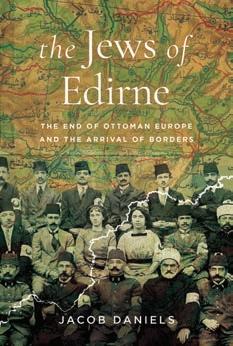
Exploring their roots in classical texts of Kabbalah, including the Zohar and works of Safed Kabbalah, Sachs-Shmueli demonstrates how early Hasidic masters like the Baal Shem Tov, the circle of the Maggid of Mezhrich, Shneur Zalman of Liadi, and R. Nachman of Bratslav deliberately cultivated a tense emotional culture through the mental guidelines in their texts. rough an emphasis on God-fearing and the fear of sin, they motivated followers of the new movement to a ain the mystical ideal while simultaneously fostering a social community devoted to divine worship according to Jewish law, in the face of persecution and secularization.
For readers interested in Jewish mysticism and Hasidism, Sacred Emotions argues that negative emotions serve as crucial catalysts for intensifying religious devotion and shaped the rise and cohesion of the Hasidic movement.
Leore Sachs-Shmueli holds the position of Lecturer in Jewish Philosophy at Bar Ilan University.
Using Ladino, French, English, and Turkish sources, Daniels o ers a new take on the ways in which ethno-religious minorities experienced the transition “from empire to nation-state.” Rather than tracing a linear path, Edirne Jews zigzagged between the O oman Empire and three nation-states—without moving a mile. And by maintaining interstate Sephardi networks, they resisted pressure to treat the shi ing border as a limit to their zone of belonging. Ultimately, proximity to the border would undo Edirne’s Jewish community, but the way this ending came about—local Jews were rarely killed or deported—challenges common assumptions about state borders and Jewish history. By studying Jewish encounters with the nation-state alongside the emergence of modern borders, Daniels sheds light on both phenomena.
Jacob Daniels is Assistant Professor of Instruction and Assistant Director of the Shusterman Center for Jewish Studies at e University of Texas at Austin.

Brazilian Belonging examines a century of Brazilian Jewish political activism, from the onset of Jewish mass migration to Brazil in the early 1920s to the present. e home of the largest Jewish community living in a nonwhite-majority country in the world, and a country that has witnessed extended periods of democratic and dictatorial rule, Brazil o ers an important window for rethinking Jewish ideas about race and nation, democracy and dictatorship, and local and global forms of state violence.

e Hispanic Community of Mérida, Yucatán, 1690–1730

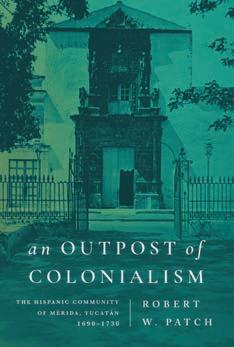
In this book, Michael Rom highlights the important roles Brazilian Jews played in prominent social movements— movements that contested the meaning of the discourse of racial democracy, fought against the military dictatorship, and sought out new political possibilities following the return of democratic rule. He draws on extensive research—including previously unexamined secret police and intelligence records, the Brazilian Yiddish press, and oral history interviews—to illuminate decades of Brazilian Jewish activism under both democratic and dictatorial regimes. O ering the rst study of modern Jewish politics and Latin American ethnic belonging throughout the Cold War, this book situates Brazilian Jewish activism within the transnational contexts of the immediate a ermath of the Holocaust, Cold War superpower rivalries, Latin American revolutionary insurgencies, and the Israeli-Palestinian con ict.
Michael Rom is a Visiting Assistant Professor of Modern Jewish History and Culture at Hebrew Union College, Los Angeles.
Using the categories of status, political power, and wealth, Robert W. Patch shows how Hispanic society in Mérida, Yucatán was strati ed into upper, middle, and lower classes. Lacking any exportable resource except co on textiles extracted from Maya people and exported to northern Mexico, the Hispanic community earned enough through those exports to import the material goods necessary to maintain a “Spanish” identity. e only productive economic activity of the Hispanic people was ca le ranching, and ownership of ca le was widespread, though some owned a lot more than others. Political participation was shared by the upper and middle classes, but a power elite dominated politics. Socially, people usually married within their social class and remained separate from the Maya population. e upper class, however, was not an endogamous caste descended from the conquistadors, but instead accepted wealthy people, including European immigrants, into their group. Basques, Cantabrians, and Canary Islanders tried to maintain their separate ethnicities but ultimately created a new “Spanish” identity, and many entered the upper class. Social mobility upward and downward was thus common in colonial Mérida. An Outpost of Colonialism illuminates this process of class formation and explains how the successful social reproduction of Hispanic society perpetuated the correlation between skin color (race) and social class.
Robert W. Patch is Professor Emeritus of History at the University of California, Riverside.

e Americas is a region on the move and is both the source and recipient of some of the largest migrations in the world today. While much scholarship and public commentary focus on the considerable movement of people northward toward the United States, most of the millions of migrants from the Americas are in fact, the authors reveal, staying within other countries in Latin America and the Caribbean. rough a combination of engaging narratives and evidence-based analysis, On the Move tells a story of both triumph and tragedy. e authors explore the complex composition of migration ows and the varied and uneven ways in which host countries in the region have responded. is book takes readers beyond the typical debates on US immigration policy and represents the rst comprehensive look at how countries in Latin America and the Caribbean are reacting to an unprecedented wave of people around the world who choose—or are forced—to move across borders.
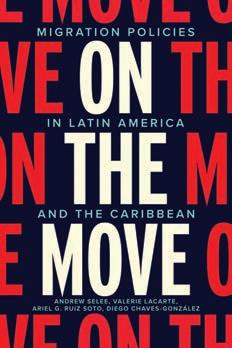

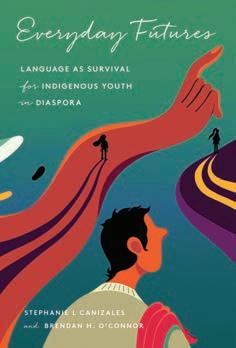
Andrew Selee is the President of the Migration Policy Institute (MPI) and Adjunct Professor at Georgetown University.
Valerie Lacarte is a Senior Policy Analyst at MPI.
Ariel G. Ruiz Soto is a Senior Policy Analyst at MPI.
Diego Chaves-González is Senior Manager for MPI’s Latin America and Caribbean Initiative.
Despite increasing a ention on unaccompanied Central American youth migration to the United States, li le empirical research has examined the crucial role of language in the incorporation process, particularly for Indigenous youth. Drawing on the perspectives of Maya (primarily K’iche’)-speaking Guatemalan youth, Everyday Futures explores their experiences of language socialization in the broader Los Angeles immigrant community. Stephanie L. Canizales and Brendan H. O’Connor trace the factors that were most important to their quest for well-being and belonging across Guatemalan and American societies. Coming from contexts where Maya languages were stigmatized, these youth’s migration journeys and early years a er arrival were characterized by what they called “preparation” and “adaptation,” processes through which they actively sought the linguistic and social expertise needed to promote their long-term survival in the US. While many faced struggles, some were able to achieve social and economic mobility, which instilled in them a sensibility of survival that enabled them to advocate for more recently arrived Maya youth and the maintenance of Maya language and culture. is book sheds important light on the dynamic process of “future-making” for Indigenous youth and yields rich insights into the role of language in creating hope in the diaspora.
Stephanie L. Canizales is Assistant Professor of Sociology at the University of California, Berkeley, and Faculty Director of the Berkeley Interdisciplinary Migration Initiative. She is author of Sin Padres, Ni Papeles (2024).
Brendan H. O’Connor is Associate Professor in the School of Transborder Studies at Arizona State University. He is the author of Multilingual Baseball (2023).
Dignity represents the inherent and equal worth of each one of us. It is how we think about the value of our lives. It is how we think about justice, and about the injustices that cause people to struggle and su er. In Dignity in America, Erin Daly explores how we can resolve the social con icts that divide us as a nation by transforming them under the lens of human dignity.
It may apply di erently in di erent cultural se ings, but the core meaning of dignity is both intuitive and universal. It stands for a set of interlocking ideas that focus on each person’s need to freely develop their full personality and identity. Using the language of dignity that has already taken root in international law and courts all around the world, Daly shows us how to think about controversies, ranging from a rmative action to abortion to climate justice to democracy, with a view toward enhancing our ability to live with dignity.
Daly presents dignity as a universal value that transcends partisan debates and, in many cases, presents a clear path to the most just solutions to the con icts that divide us as a nation. She introduces the American voting public to the idea of dignity by posing and wrestling with a series of questions: How can we insist on a politics that really protects human dignity? How can we use the idea of dignity to guide us toward solutions that allow more people to live each day with more of it?
If we pay a ention to the core needs of people in society, we can make political choices that be er protect us all, allowing us to ourish as individuals while living in communities based on justice for all.


Erin Daly is Professor of Law at Widener University Delaware Law School and Director of the Dignity Rights Clinic, the world’s rst legal clinic dedicated to advancing the dignity rights of people around the world. She is the author of Dignity Rights (2012; 2020).

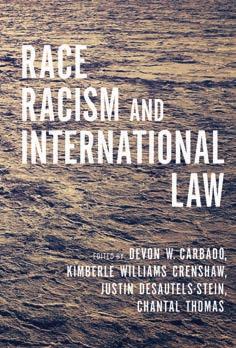
From its inception in the 70s and 80s, critical race theory’s target was the eld of law, revealing it to be a repository for racial power. is particular critique of law was explosive because of law’s putatively apolitical status, making it a unique site for an intellectual sit-in that has forever changed the way that race and racism are understood in American society.

Several decades later, as indicators of populism and white nationalism spread across North America and Europe, critical race theory remains markedly absent from discourses in global a airs and international law. is volume opens the door for CRT to enter the international sphere. Featuring contributions from 30 of today’s leading scholars from around the world, Race, Racism, and International Law explains how the concept of racial di erence sits at the foundation of the legal, political, and social structures of hierarchy that shape the contemporary global order. Helmed by four pioneering experts, two in CRT and two in international law, the volume’s approach targets regimes of power and violence that implicate racism, capitalism, and colonialism. is volume lays the groundwork for urgent and provocative new modes of critique and analysis.
Devon W. Carbado is the Honorable Harry Pregerson Professor of Law at UCLA School of Law.
Kimberlé Williams Crenshaw is Professor of Law at UCLA and at Columbia Law School.
Justin Desautels-Stein is Professor of Law at the University of Colorado Law School.
Chantal omas is Professor of Law at Cornell Law School.
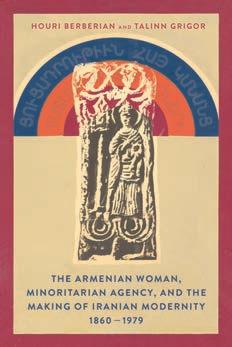
With this book, Houri Berberian and Talinn Grigor o er the rst history of Armenian women in modern Iran. Foregrounding the work of Armenian women’s organizations, the authors trace minoritarian politics and the shi ing relationships among doubly minoritized Armenian female subjects, Iran’s central nodes of power, and the Irano-Armenian patriarchal institutions of church and political parties.

Engaging broader considerations around modernization, nationalism, and feminism, this book makes a conceptually rich contribution to how we think about the history of women and minoritized peoples. Berberian and Grigor read archival, textual, visual, and oral history sources together and against one another to challenge conventional notions of “the archive” and transform silences and absences into audible and visual presences. Understanding minoritarian politics as formulated by women through their various forms of public and intellectual activisms, this book provides a groundbreaking intervention in Iran’s history of modernization, Armenian diasporic history, and Iranian and Armenian feminist historiography.
Houri Berberian is Professor of History at the University of California, Irvine, and author of Roving Revolutionaries: Armenians and the Connected Revolutions of the Russian, Iranian, and O oman Worlds (2019).
Talinn Grigor is Professor of Art History at the University of California, Davis, and author of e Persian Revival: e Imperialism of the Copy in Iranian and Parsi Architecture (2021).

e New Preachers of Egypt— so named because of their novel preaching styles, which incorporate everything from melodrama to music to self-help—came to prominence on the world’s rst Islamic television channel on the cusp of the Arab Spring uprisings. ey promoted an innovative and inclusive Islamic piety that millions of young middle-class viewers found radical and compelling—but were scorned as neoliberal by le ists, as stealth Islamists by secularists, and as too Westernized by other Muslim preachers.



Drawing on long-term eldwork with the New Preachers, their producers, and followers in Cairo, Yasmin Moll shows how Islamic media and the social life of theology ma ered to contestations over the shape of a New Egypt. ese mass-mediated fractures within Islamic Revivalism were happening at a time of both revolutionary possibility and authoritarian entrenchment. e New Preachers’ Islamic media inspired a “revolution within” that transcended the country’s divisions and anticipated the ethos of creativity, solidarity, and coexistence that soon would mark Tahrir Square, the ethical epicenter of the 2011 uprising. Vividly wri en and boldly theorized, e Revolution Within challenges conventional accounts of the 2011 revolution and its a ermath as a struggle between secular and religious forces, reconsidering what makes a practice virtuous, a public Islamic, a way of life Godly.
Yasmin Moll is Assistant Professor of Anthropology at the University of Michigan.
Living On centers around the unprecedented mobilization of mental health professionals in the wake of a massive earthquake that struck western Turkey in 1999—a disaster that le more than 20,000 people dead and hundreds of thousands of residents displaced. Working amid unimaginable destruction and su ering, volunteer psychiatrists and psychologists would quickly improvise a makeshi response, o ering thousands of survivors access to psychiatric care for the rst time. Never before had there been such a collective expression of concern for people’s psychological well-being. Christopher Dole explores how this psychiatric response fashioned individual and collective lives far into the disaster’s future. Based on research spanning two decades, from the earthquake to its twentieth anniversary, he considers how this convergence of geological activity and psychiatric expertise introduced novel psychiatric and psychological discourses into everyday lives of survivors, as it also animated new visions of self, society, and technopolitical promise. Living On not only o ers insight into Turkey’s transformations over the opening decades of the twenty- rst century, but it also sheds light on a more general arrangement of disaster, governance, and medical expertise—one that increasingly characterizes our era of planetary ecological crisis.
Christopher Dole is Professor of Anthropology at Amherst College. He is the author of Healing Secular Life: Loss and Devotion in Modern Turkey (2012) and co-editor of e Time of Catastrophe (2015).
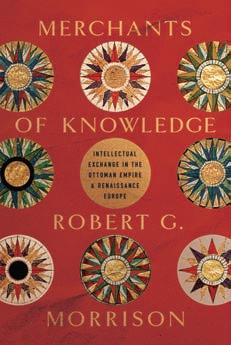
Between 1450 and 1550, a remarkable century of intellectual exchange developed across the Eastern Mediterranean. As Renaissance Europe depended on knowledge from the O oman Empire, and the courts of Mehmed the Conqueror and Bayezid II greatly bene ed from knowledge coming out of Europe, merchants of knowledge—multilingual and transregional Jewish scholars— became an important bridge among the powers.

With this book, Robert Morrison is the rst to track the network of scholars who mediated exchanges in astronomy, astrology, Qabbalah, and philosophy. eir books, manuscripts, and acts of translation all held economic value, thus commercial and intellectual exchange commingled—knowledge became transactional as these merchants exchanged texts for more intellectual material and social capital. While parallels between medieval Islamic astronomy and the famous heliocentric arrangement posited by Copernicus are already known, Morrison reveals far deeper networks of intellectual exchange that extended well beyond theoretical astronomy and shows how religion, science, and philosophy, areas that will eventually develop into separate elds, were once interwoven. e Renaissance portrayed in Merchants of Knowledge is not, from the perspective of the O oman Muslim contacts of the Jewish merchants of knowledge, hegemonic. It’s a Renaissance permeated by diversity, the cultural and political implications of which the West is only now waking up to.
Robert G. Morrison is a professor at Bowdoin College. He is the author of e Light of the World: Astronomy in al-Andalus (2016).
Astrologers, Science, and Authority in the O oman Empire, 1450–1600

Forgo en Experts o ers a history of O oman court astrologers and traces their shi ing authority and prestige over the long sixteenth century. ese individuals served the O oman court with their expertise in mathematical, astronomical, and astrological sciences, distinguishing themselves from other occult practitioners and esoteric specialists. While both prophecy and prognostication are a empts to map the terrain of the future, the astrologers’ work did not claim spiritual weight as a prophecy but relied instead on methods of prediction developed from data and pa erns elaborated through technical and scienti c writings.
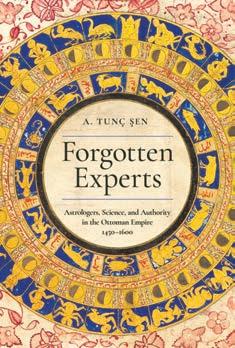
Drawing on extensive manuscript and archival records wri en in O oman Turkish, Persian, and Arabic, A. Tunç Şen writes a history of science, state formation, and bureaucracy within the overarching tale of O oman imperial formation and protocols. He invites readers to follow O oman court astrologers’ uctuating careers as practitioners of a contentious science and shows how this class of learned individuals constructed its scienti c authority despite numerous cultural, societal, and epistemic challenges. In understanding the expertise of court astrologers, we gain insight into the intricate social relations established and maintained between the men of knowledge and the men of rule, between expertise and statecra , in the early modern O oman imperial context.
A. Tunç Şen is Assistant Professor of History at Columbia University.
In the rst half of the twentieth century, a major change occurred in Egyptian nationalist understandings of imperialism and economic sovereignty. Where once the volatilities of foreign markets and capital were seen as the main threat, over time large landowners and their imperial allies were targeted as the principal obstacles to the country’s industrial progress. e perceived locus of imperial domination shi ed from the realm of circulation to the realm of production. Harvests of Liberation situates this transformation in the midcentury dynamics of agrarian capitalism in Egypt.
Ahmad Shokr tells a story of decolonization through the lens of co on, Egypt’s prized export. He follows a range of actors—colonial advisors, nationalist leaders, agrarian reformers, merchant- nanciers, landowners, and rural workers—whose interactions moved the levers of the co on trade from institutions that facilitated accumulation on an imperial scale to new sites of control within the nation-state. Amidst depression and war, the transformation of Egypt’s co on economy prompted nationalists to embrace policies of land reform and industrialization and adopt a new conception of history. Ultimately, Shokr argues, these e orts set the stage for the construction of a postcolonial republic under Gamal Abdel Nasser, where national liberation became equated with national development.


Ahmad Shokr is Associate Professor of History at Swarthmore College.


Lasting from September 1980 to August 1988, the Iran-Iraq War was the longest conventional war fought between two states in the twentieth century. It marked a period that began just a er a revolutionary government in Iran became an Islamic Republic and Saddam Hussein consolidated power in Iraq. It ended with both wartime governments still in power, borders unchanged, yet hundreds of thousands of people dead. Neither side emerged as a clear victor, but both sides would eventually claim victory in some form.
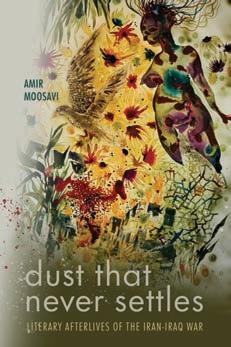
Dust at Never Se les considers how Iraqi and Iranian writers have wrestled with representing the Iran-Iraq War and its legacy, from wartime to the present. It demonstrates how writers from both countries have transformed once militarized, o cially sanctioned war literatures into literatures of mourning, and eventually, into vehicles of protest that presented powerful counternarratives to the o cial state narratives. In writing the rst comparative study of the literary output of this war, Amir Moosavi presents a new paradigm for the study of modern Middle Eastern literatures. He brings Persian and Arabic ction into conversation with debates on the political importance of cultural production across the Middle East and North Africa, and he puts an important new canon of works in conversation with comparative literary and cultural studies within the Global South.
Amir Moosavi is Assistant Professor in the Department of English at Rutgers University-Newark.


is book develops from the position that the colonization of Palestine—like other imperial and se ler colonial projects—cannot be understood outside the grammar of race. Race and the Question of Palestine explores how race operates as a technology of power and colonial rule, a political and economic structure, a set of legal and discursive practices, and a classi catory system.
O ering a wide-ranging set of essays by historians, legal scholars, political scientists, sociologists, literary scholars, and race critical theorists, this collection illuminates how race should be understood in terms of its political work, and not as an identity category interchangeable with ethnicity, culture, or nationalism. Essays build on a long-standing tradition of theorizing race in Palestine studies and speak to four interconnected themes—the politics of racialization and regimes of race, racism and antiracism, race and capital accumulation, and Black–Palestinian solidarity. ese engagements challenge the exceptionalism of the Palestinian case, and stress the importance of locating Palestine within global histories and present politics of imperialism, se ler colonialism, capitalism, and heteropatriarchy.
Lana Tatour is a Senior Lecturer in Global Development at the University of New South Wales.
Ronit Lentin is Associate Professor of Sociology (retired) at Trinity College Dublin.
Contributors: Yasmeen Abu-Laban, Seraj Assi, Abigail B. Bakan, Zvi Ben-Dor Benite, Yinon Cohen, Noura Erakat, Michael R. Fischbach, Neve Gordon, Alana Lentin, David Palumbo-Liu, John Reynolds, Kieron Turner

Starting in the 1970s, Palestinian theater ourished as part of a Palestinian cultural spring. In the absence of local radio, television, and uncensored journalism, theater production became the leading form of artistic expression, and Palestinian theater artists self-identi ed as a movement. Although resistance was not their sole function, these theater makers contributed to an active cultural resistance front. With this book, Samer Al-Saber tells the story of the Palestinian eater Movement over nearly three decades, as they created plays and productions that articulated versions of Palestinian identity, critiqued social norms, celebrated and extended Palestinian cultural values, and challenged the power disparity created by the Occupation.


e Philippines is among the most successful migrant-sending nations in the world, both lauded and critiqued for exporting its own citizens to a global labor market. Yasmin Y. Ortiga brings readers beyond this popular image to explore questions o en overlooked: What happens when workers who were encouraged to emigrate are suddenly unable to leave?
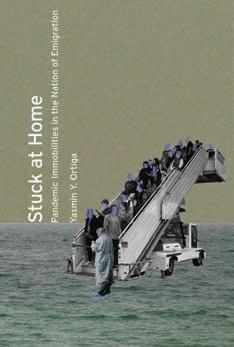
e struggles between Palestinian theater artists and Israeli authorities form the central relationships in this history. Al-Saber juxtaposes the agency of Palestinian theater artists, in their determination to perform against immense challenges, with the power of Israeli authorities to grant or deny permission to theatrical productions. e legal structure of institutionalized censorship prevented Palestinian artists from expressing their chosen message, and the theater movement’s search for permission to perform illuminates the disparity in power between the occupier and the occupied. In writing the rst history of the Palestinian eater Movement, Al-Saber ampli es necessary voices in this Palestinian cultural history, told from below.
Samer Al-Saber is Assistant Professor of eatre at Williams College.
Stuck at Home examines how the Philippine state and its aspiring migrants negotiated the meaning of immobility amid the COVID-19 pandemic. In this pioneering book, Ortiga studies the narratives that emerged around two groups of Filipino workers: nurses banned from leaving the country and cruise workers who returned home a er COVID-19 shut down the travel industry. Ortiga emphasizes the high stakes in telling the “right” story of immobility to a nation built around emigration—one that provides a compelling rationale for who deserves to move and who can be forced to stay.
A gripping account of political interests, frustrated dreams, and an unprecedented crisis, Stuck at Home reveals how migration governance is not only about regulating people’s movement, but also de ning the meaning and implications of remaining in place.
Yasmin Y. Ortiga is Assistant Professor of Sociology at Singapore Management University. She is the author of Emigration, Employability, and Higher Education in the Philippines (2018).
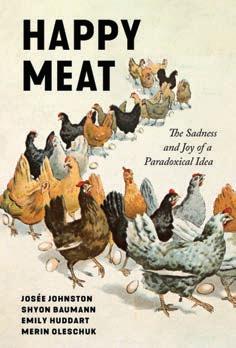
North Americans love eating meat. Despite the increased awareness of the meat industry’s harms–violence against animals, health problems, and associations with environmental degradation–the rate of meat eating hasn’t changed signi cantly in recent years. Instead, what has emerged is an uncomfortable paradox: a need to square one’s values with the behaviors that contradict those values.

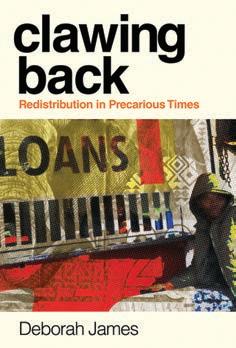

Using an immense, one-of-a-kind dataset, Happy Meat explores the emotions that underpin our moral decision-making in this meat paradox. So-called conscientious meat-eaters use the notion of “happy meat” to rationalize their behaviors by adhering to ostensibly healthy, ethical, and sustainable ways to consume meat. Happy meat might be labeled grass fed, free-range, antibiotic free, naturally raised, or humane. e people who produce and consume it, together, make up the complex landscape of “conscientious” meat-eating in modern Western societies.
e discourse of happy meat ultimately may not be a su cient response to the critiques of meat-eating, rife as it is with internal contradictions. However, the authors make the case for its cultural and theoretical importance, as it exempli es the signicance of social context and emotions for understanding a itudes and behaviors.
Josée Johnston is Professor of Sociology at the University of Toronto.
Shyon Baumann is Professor of Sociology at the University of Toronto.
Emily Huddart is Professor in the Department of Sociology at the University of British Columbia.
Merin Oleschuk is Assistant Professor at the University of Illinois at Urbana-Champaign.
e impulse to redistribute wealth is said to be a tool to counter inequalities, applied by the state or society to curb the worst excesses of capitalist exploitation and free trade. In se ings where previous political regimes are reformed, or toppled and replaced by new ones, redistribution can also be a policy speci cally oriented at redress, one exercised at the formal level of policy. Drawing on a comparative ethnography in South Africa and the United Kingdom, Clawing Back explores how notions of reallocation and payout are intimately connected with those of compensation for a loss. Where nancialization is accompanied by increased informalization, redistribution can equally involve the market as well as kinship and social networks. Drawing on a rich ethnography of the human relationships at the center of redistribution, Deborah James shows how borrowing can provide negotiation opportunities to wage earners and welfare bene ciaries alike: they make use of debt to constitute relations and futures, to engage with the state, to convert between commodi ed and non-commodi ed relationships. Rather than suggesting that nancialization is serving either a totally negative or wholly bene cial purpose, James posits a di erent way of visualizing the relationship between the nance industry and the world of everyday needs.
Deborah James is Professor of Anthropology at the London School of Economics and Faculty Associate in the International Inequalities Institute. She is the author of Money From Nothing (Stanford 2015).
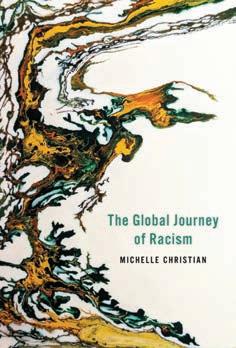
In e Global Journey of Racism, Michelle Christian provides a uni ed narrative of how the world’s racial hierarchies came to be. Christian’s story begins before the Ku Klux Klan, Nazi Germany, and South African Apartheid, tracing the historical lineage of white supremacy to the expansion of western, European empire. She uncovers the vast network of legal, political, economic, and social mechanisms— most potently, enslavement—that made up the original design for racialized knowledge, capitalist systems, and colonial management. Contemporary manifestations of this design may have new rhythms, beats, and faces, but they are all rooted in the pre-modern hierarchy of global white supremacy and global anti-Blackness.


In 1898 the United States became a formal overseas empire and claimed sovereignty over the Philippine islands, justifying its rule in explicitly racial terms. Less than y years later, in 1946, Philippine independence was recognized by the United States, even as it continued to exert in uence over the domestic and foreign a airs of the newly decolonized Republic. Despite some di erences, U.S. control remained racial and imperial.
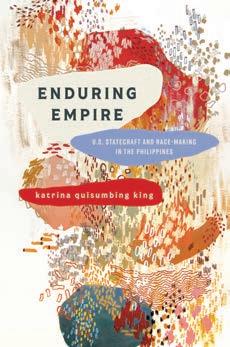
Christian brings imperial history into conversation with the present, and places the racial mechanisms at work in distinct nations alongside each other, advancing a novel analysis of the global racial system. In doing so, she responds to scholarship on race and racism that emphasizes cultural speci city, and asserts the dominance of a modern world that, despite appeals to the contrary, remains brazenly, and without question, racist.
By taking the entire world into her critical gaze, Christian also creates space for stronger, more globally-oriented resistance.
Michelle Christian is Associate Professor of Sociology at the University of Tennessee, Knoxville.
Enduring Empire shows how U.S. federal state actors translated their ideas of race into state structures. rough innovating constitutional law, bureaucratic administration, and legislation, state actors built a durable and exible system of racial-imperial rule that not only lasted beyond the period of formal empire but continues to this day. katrina quisumbing king traces debates among U.S. presidents, federal legislators, administrators, and justices about what kind of state the United States should be, the place of nonwhite people in the polity, and the best way to maintain U.S. white hegemony. In charting how state actors’ positions—some nativist, isolationist, and protectionist and others expansionist, interventionist, and imperialist—evolved, quisumbing king identi es key moments when they cemented racial ideas into law and reshaped the terms of U.S. racial-imperial formation.
katrina quisumbing king is Assistant Professor of Sociology at Northwestern University.

Arti cial intelligence has moved from the lab into everyday life, and is now seemingly everywhere. Arguably, there are as many foci of concern about AI as there are implementations of it. AI and Assembly invites readers to explore a fundamental, and overlooked, issue: the interaction between arti cial intelligence and freedom of assembly. is freedom is core to collective action, civil society, and liberal democracy. Now, as sensors collect, analyze, and make data-driven decisions about us when we are using screens and when we are not, when we are inside our homes and outside in public, when we are in transit or asleep, when we’re alone and when we’re together, we must address AI’s impact on assembly. Where and how does assembly take place, why, and who participates by choice and who by coercion?
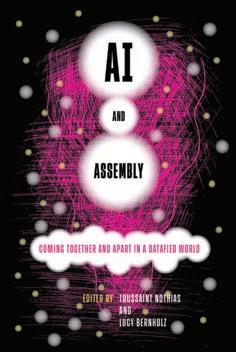


From audits of Facebook’s algorithms to campaigns against facial recognition, from secretive technological experiments to rideshare drivers advocating for fair pay, AI and Assembly provides a unique view and global perspectives on the future of assembly in a world taken over by AI, as well as envisions of a more just digital future.
Toussaint Nothias is Clinical Associate Professor at XE and a liated faculty in the Department of Media, Culture, and Communication at New York University.
Lucy Bernholz is a Senior Research Scholar at Stanford University’s Center on Philanthropy and Civil Society and Director of the Digital Civil Society Lab.
One in ten children worldwide is involved in some form of child labor. While almost half are in occupations that put their safety at risk, the other half have “grey” jobs like industrial farming or selling candy on the street. Children in these positions o en defend the value of their work, and some even join social movements to demand the “right to work with dignity.” In Good Kids, Isabel Jijon reveals how global campaigns against child labor are o en met with resistance from the very children they are meant to protect. Conducting interviews in Bolivia and Ecuador with children who defend their labor, Jijon explores what they mean by “value,” “rights,” and “dignity” in this context. She nds that working children seek a sense of self-worth, as well as worthiness in their closest relationships; they use work to prove that they are “good sons/daughters,” “good friends,” or simply”good kids.” Drawing, also, on interviews with reformers invested in ending child labor, Jijon produces a nuanced picture of the ways that global campaigns can, unintentionally, undermine these relationships and make working children feel stigmatized rather than protected. is fascinating and challenging study of moral meaning-making upends simple understandings of harm and worthiness in a vast but poorly understood labor market.
Isabel Jijon is a Lecturer on Sociology at Harvard University. She is also a Data Consultant at the United Nations Children’s Fund (UNICEF) in the Child Protection and Development team.

e personal nature of domestic labor, and its location in the privacy of the employer’s home, means that domestic workers have long struggled for equitable and consistent labor rights. e dominant discourse regards the home as separate from work, so envisioning what its legal regulation would look like is remarkably challenging. In Bringing Law Home, Katherine Eva Maich o ers a uniquely comparative and historical study of labor struggles for domestic workers in New York City and Lima, Peru. She argues that if the home is to be a place of work then it must also be captured in the legal infrastructures that regulate work. Yet, even progressive labor laws for domestic workers in each city are sti ed by historically entrenched pa erns of gendered racialization and labor informality. Peruvian law extends to household workers only half of the labor protections a orded to other occupations. In New York City, the law grants negligible protections and deliberately eschews language around immigration. Maich nds that coloniality is deeply embedded in contemporary relations of service, revealing important distinctions in how we understand power, domination, and inequality in the home and the workplace.


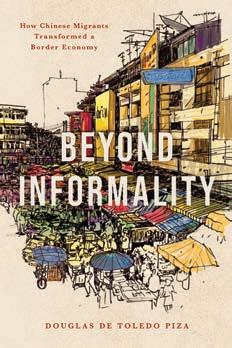
Katherine Eva Maich is Assistant Professor of Sociology at Texas A&M University.
Chinese migrants are playing increasingly large, strati ed roles in the informal economies of South America. One of the clearest examples of this phenomenon is in the region’s largest informal economy of counterfeit and smuggled goods, spanning from Ciudad del Este, the Paraguayan border city, to São Paulo, Brazil’s largest metropolis. Here, Chinese vendors, on the one hand, are some of the most marginalized workers facing a doubly di cult landscape due to their precarious immigration status and their illegal economic activities. ey bear the brunt of working on the margins of the law, and as a result do not always reap the bene ts of their own labor. A transnational elite of Chinese businesspeople, on the other hand, pro ts and pro teers from the booming market. ey leverage their economic, social, and political power to bend the law to their favor and get away with irregularities, violations, and criminal behavior. In Beyond Informality Douglas de Toledo Piza reveals the complex ways these actors interact with each other, and how the law shapes those interactions. He argues that structural inequalities in the global economy push Chinese migrants to South America, while placing them, surprisingly, in positions to overhaul markets and tip the scales of deep-seated power structures in the Global South.
Douglas de Toledo Piza is Assistant Professor of International A airs at Lafaye e College.
While we can easily make sense of the need for corporate funding to keep a oat cultural spaces, less obvious are the reasons that corporations give to them. In Black Culture, Inc., Patricia A. Banks de ly weaves innovative theory with a discerning critical gaze at the various agendas in ltrating memorials, museums, and music festivals meant to celebrate Black culture. She argues for a deeper understanding of the hidden transactions being conducted that render corporate America dependent on Black culture.
Patricia A. Banks is Professor of Sociology and a faculty member in the Program in Africana Studies and the Program in Entrepreneurship, Organizations, and Society at Mount Holyoke College. She is author of Represent: Art and Identity Among the Black Upper-Middle Class (2010).
When Indian leaders rst took control of their government in 1947, they proclaimed the ideals of national unity and secular democracy. rough the rst half century of nation-building, leaders could point to uneven but measurable progress on key goals. But today, many Indians live in a state of underemployment, and are one crisis away from despair. Public goods—like health, education, and the judiciary—are in woeful condition. And good jobs will remain scarce as long as that is the case. e lack of jobs will further undermine democracy, which will further undermine job creation. India is Broken provides the most persuasive account available of this economic catch-22.
Ashoka Mody is an economic historian at Princeton’s School of Public and International A airs. Formerly, he worked at the World Bank and the International Monetary Fund. He is the author of EuroTragedy: A Drama in Nine Acts (2018), and his writing appears o en in outlets such as Financial Times, Project Syndicate, and Bloomberg View
In 1967, Sireen Sawalha’s mother, with her young children, walked back to Palestine against the tra c of exile. is book is the story of Sireen’s family in the decades that followed and their lives in the Palestinian village of Kufr Ra’i. From Sireen’s early life growing up in the shadow of the ‘67 War, to the involvement of her brother in armed resistance in the First and Second Intifada, Hermez cra s a rich story of intertwining voices, mixing genres of oral history, memoir, and creative non ction. is book confronts readers with the politics and complexities of armed resistance and the ethical tensions and contradictions that arise, as well as with the dispossession and su ocation of people living under occupation and their ordinary lives in such times..
Sami Hermez is an anthropologist and teaches at Northwestern University in Qatar. He is the author of War Is Coming: Between Past and Future Violence in Lebanon (2017). His work in and out of the classroom re ects a strong commitment to freedom, justice, and equality. His family’s history of migration spans the Levant, with roots in Al-Qosh, Aleppo, Beirut, and Jerusalem. Sami lives in Doha with his family.



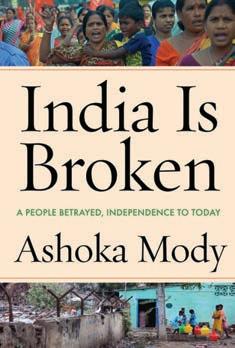


Any ta oo is the outcome of an intimate, o en hidden process. e people, bodies, and money that make ta ooing what it is blend together and form a heady cocktail, something described by the owner of Oakland’s Premium Ta oo, as “blood and lightning.” Dustin Kiskaddon takes us behind the scenes into the complex world of professional ta ooers. His captivating account explores the challenges they face on the job, including the fear of making mistakes and the evolving role of masculinity. e stories in this book teach us about the roles our bodies play in the social world, as purveyors of sociocultural signi cance, sites of capitalist negotiation, and encapsulations of the human condition.
Dustin Kiskaddon is a cultural sociologist whose work can be seen on Instagram, @Dustin.Kiskaddon. A er nearly a decade of teaching and a few years of professional ta ooing, he now uses his expertise in culture, the economy, and technology to conduct applied research.


Edited by David Kipen
California has always been, literally, a place to write home about. In this highly anticipated follow up to his book Dear Los Angeles, cultural historian and California scholar David Kipen reveals this long-storied place through its diaries and le ers.
Running from January 1 through December 31, leaping across decades and centuries, Dear California re ects on the state’s shi ing landscapes and the notion of place. Entries talk across the centuries, from indigenous stories told before the Spanish arrived on the Paci c coast through to present-day tweets, blogs, and other ephemera. Weaving together the personal, the insightful, the impressionistic, the lewd, and the hysterically funny, Dear California presents collected writings essential to understanding the diversity, antagonisms, and abiding promise of the Golden State.
California native David Kipen has worked as the San Francisco Chronicle’s book editor/critic, Director of Literature at the NEA, and, lately, L.A. Times critic at large and founder-director of the Libros Schmibros Lending Library. Previous books include Dear Los Angeles and four reissued WPA Guides. His California-set historical paranoid conspiracy thriller, e Anniversarist, is forthcoming. Really.
To understand how AI is rede ning what it means to write and think, Naomi S. Baron leads us on a journey connecting the dots between human literacy and today’s technology. From nineteenth-century lessons in composition, to mathematician Alan Turing’s work creating a machine for deciphering war-time messages, to contemporary engines like ChatGPT, Baron gives readers a spirited overview of the emergence of both literacy and AI, and a glimpse of their possible future. As the technology becomes increasingly sophisticated and uent, it’s tempting to take the easy way out and let AI do the work for us. Baron cautions that such e ciency isn’t always in our interest. As AI plies us with suggestions or full-blown text, we risk losing not just our technical skills but the power of writing as a springboard for personal re ection and unique expression.
Naomi S. Baron is Professor Emerita of Linguistics at American University. Her books include How We Read Now: Strategic Choices for Print, Screen, and Audio (2021), Words Onscreen: e Fate of Reading in a Digital World (2015), and Always On: Language in an Online and Mobile World (2008).



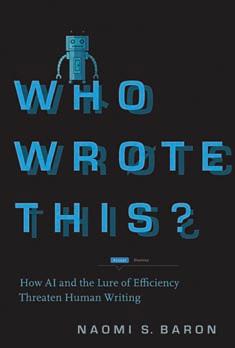
Housed at the Division of Literatures, Cultures, and Languages at Stanford University, Mantis seeks out the work of talented poets, translators and critics from around the world.
Founded in 2000 by Sara Hackenberg and Jenn Fishman, for 20 years Mantis has published a yearly print journal, run entirely by the graduate students of various national literature departments. While our disciplines may di er, we all bring our love for poetry and passion for translation to each and every issue.
As we bring the work of our magni cent contributors to a wider audience with this web imprint, we remain dedicated to print publishing with our annual issue, made possible by generous funding from the Division of Literatures, Cultures, and Languages.



From tari wars to torn-up trade agreements, Michael Beeman explores America’s recent and dramatic turn away from support for freer, rules-based trade to instead go its own new way. Focusing on America’s trade engagements in the Asia-Paci c, he contrasts the trade policy choices made by America’s leaders over several generations with those of today–decisions that are now undermining the trading system America created and triggering new tensions between America and its trading partners, allies and adversaries alike.


/ SUMMER 2025
AUTHOR INDEX
Al-Saber, Samer 36
Bak Herrie, Maja 18
Banks, Patricia A. 41
Baron, Naomi S. 42
Baumann, Shyon 37
Beeman, Michael L. 43
Benjamin, Walter 22
Berberian, Houri 31
Bernholz, Lucy 39
Bernstein, Susan 22
Blake, Jonathan S. 47
Bond- eriault, Candace 47
Bornstein, Erica 11
Boyce, Dave 7
Bulger, Anthony 17
Cahn, Naomi R. 48
Camarillo, Albert M. 47
Canizales, Stephanie L. 29
Carbado, Devon 31
Cebulko, Kara B. 48
Chang, Gordon H. 16
Chaves-Gonzalez, Diego 29
Chavez, Leo R. 9
Christian, Michelle 38
Chun, Jennifer Jihye 11
Chung, Kimberly 14
Clavel, Damian 17
Cohn, Elisha 21
Crawford, Bridget J. 48
Crenshaw, Kimberlé Williams 31
Daly, Erin 30
Daniels, Jacob 27
Daub, Adrian 48 de Toledo Piza, Douglas 40
Deger, Jennifer 47
Desautels-Stein, Justin 31
Dest, Anthony 10
Dole, Christopher 32
Douglass, Patrice D. 23
Earhart, Amy E. 24
Efron, John 1
Fa ik, David 20
Fenves, Peter 22
Ferguson, Susanna 48 Fowler, George 17
Fox, Sandra 47
Garvey Berger, Jennifer 48
Gilman, Nils 47
Glover, William J. 12
Grigor, Talinn 31
Gumbrecht, Hans Ulrich 20
Hamed-Troyansky, Vladimir 47
Han, Byung-Chul 47
Han, Ju Hui Judy 11
Hart, Stuart L. 47
Hermez, Sami 41
Ho man, Andrew J. 5
Huddart, Emily 37
Humphris, Rachel 8
Imber, Elizabeth E. 26
Inouye, Karen M. 48
Jackson, Stuart E. 4
James, Deborah 37
Jijon, Isabel 39
Johnston, Josée 37
Kameo, Nahoko 48
Kaminer, Matan 48 Kayes, D. Christopher 48 Kelly, Adam 49
Kipen, David 42 Kippur, Sara 25
Kiskaddon, Dustin 42 Lacarte, Valerie 29
Lachter, Hartley 49
Laruelle, Marlene
SPRING / SUMMER 2025
CATALOG SALES INFORMATION
General Inquiries
Stanford University Press 485 Broadway, First Floor Redwood City, CA 94063-8460 Tel: 650.723.9434 information@www.sup.org www.sup.org
We invite you to subscribe to our newsle ers and subject area announcements: sup.org/about/email/
Follow us:
facebook.com/stanforduniversitypress stanfordupress @stanfordpress @stanfordpress.bsky.social Blog: stanfordpress.typepad.com
Individuals
Order through your local bookseller or at sup.org.
Examination/Desk Copy Requests
To request an examination or desk copy, nd the title on our website and complete the electronic submission form. Examination and desk copies are subject to restriction. For detailed information on approval policies visit sup.org/requests.
Media
For review copies, submit your request online at sup.org or e-mail us at publicity@www.sup.org. Allow 3–4 weeks for processing and shipping. Please call to con rm any urgent requests. For publicity queries, please contact: Bridget Kinsella Publicist bridgetkinsella@stanford.edu
Libraries
Stanford University Press books are available through all major library wholesalers, as well as through our main distributor. Our books are printed on acid-free paper and we participate in the Cataloging in Publication (CIP) program of the Library of Congress.
Special discounts for bulk purchases are available to corporations, professional associations, and other organizations. For details, please contact: sales@www.sup.org
Distribution
NORTH AMERICA AND LATIN AMERICA
Stanford University Press is distributed by Ingram Academic and Professional, an Ingram brand. Customer service and ful lment enquiries should be directed to:
Ingram Content Group LLC
One Ingram Blvd. La Vergne, TN 37086
Tel: 866.400.5351
ips@ingramcontent.com
Booksellers
Sales representation in the US and Canada is provided by the Columbia University Press Sales Consortium. Retail and wholesale orders may be sent to:
Catherine Hobbs
Sales Consortium Manager Tel: (804) 690-8529
ch2714@columbia.edu
Conor Broughan
Northeast Sales Representative Tel: 917-826-7676
cb2476@columbia.edu
Kevin Kurtz
Midwest Sales Representative Tel: 773 316-1116
kk2841@columbia.edu
William Gawronski
Western Sales Representative Tel: (310) 488-9059
wg2289@columbia.edu
Samuel Ja e Goldstein Sales Associate Tel: 212-459-0600
sj3176@columbia.edu
For your best discount, please order from your sales representative, or by selecting “publisher direct” on Ingram iPage.
In North America, prices marked HC and TP carry a trade discount; prices marked AC carry an academic trade discount; prices marked SDT carry a short discount. For a full list of in-print backlist titles, visit us at sup.org or contact sales@www.sup.org.
View this catalog on Edelweiss by visiting: h ps://tinyurl.com/S2025-SUP
UK, EUROPE, ASIA/PACIFIC, MIDDLE EAST, AFRICA, AUSTRALIA, NEW ZEALAND
Stanford University Press is distributed in these territories by Combined Academic Publishers (CAP), part of the Mare Nostrum Group
Orders and sales or marketing enquiries should be directed to: enquiries@combinedacademic.co.uk
Customer service and ful lment enquiries should be directed to:
Wiley Distribution Services European Distribution Centre
New Era Estate
Oldlands Way
Bognor Regis
West Sussex PO22 9NQ
United Kingdom Tel: +44 (0) 1243 843291 mng.csd@wiley.com
For rights and permissions issues, please contact:
Kristen Spina Harrison, Rights and Contracts Manager permissions@www.sup.org
Information in this catalog, including publication dates, page counts and prices are subject to change without prior notice.
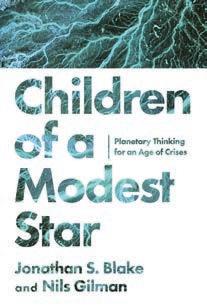


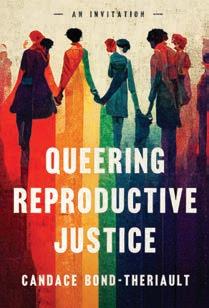
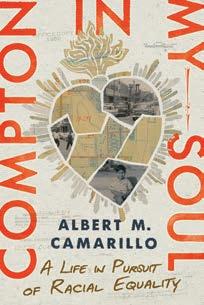




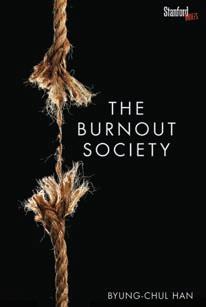


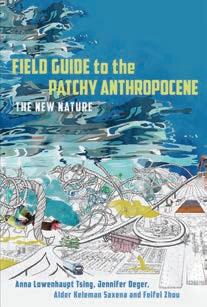

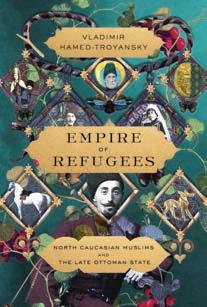










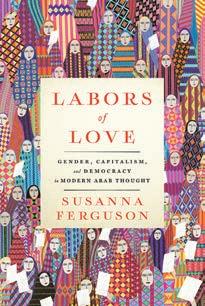
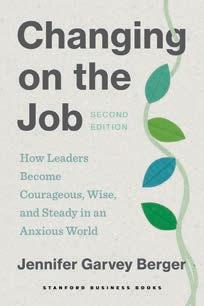




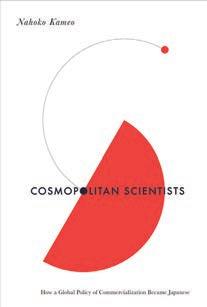
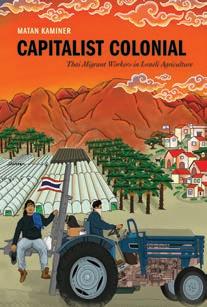

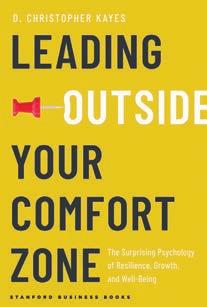



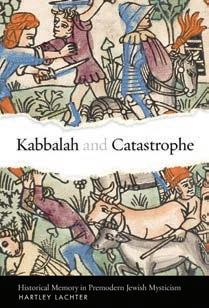

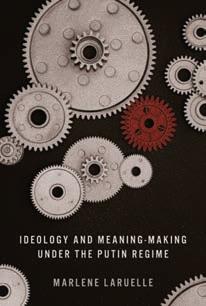

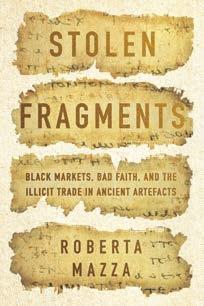





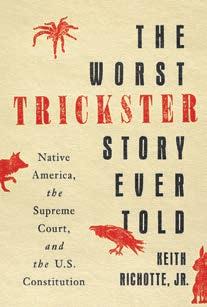


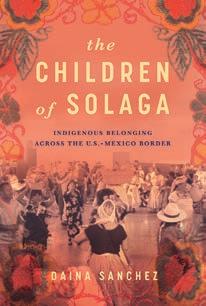
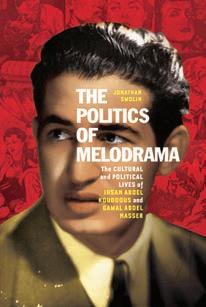

www.sup.org

